1. THE ANCIENT GREEK LEGACY

THE ATHENIAN CONTRIBUTION
The 500s to the 300s B.C.
CONTENTS
 The ancient Greek political-intellectual The ancient Greek political-intellectual
legacy
 Greek origins Greek origins
 Early philosophical development: Early philosophical development:
Materialists versus Mystics
 Athens' rise to glory Athens' rise to glory
 Athens' political-social-moral decline Athens' political-social-moral decline
 The Big Three: Socrates, Plato and The Big Three: Socrates, Plato and
Aristotle
The textual material on this webpage is drawn directly from my work
A Moral History of Western Society © 2024, Volume One, pages 31-52.
|
A Timeline of Major Events during this period
BC
1900s-1500s? Mycenaeans (or Achaeans) migrate from from S.W. Asia into Greece setting up city-states headed by kings (Athens,
for example)
1200? Possible time of the Trojan War (mainland Greeks v. Trojans)
1150? Doric Greeks begin their invasion of Mycenaean Greece ...causing – or taking
advantage of – a "Dark Age" that descends upon Greece (1150-750 BC)
1000s Doric pressures inspire Greek migration to Asia Minor: Ionians from Attica to Western shores of today's Turkey
(Ionia with its city of Miletus); Aeolians to the Northwestern shores / Dorians to the
Southern shores and then Crete
Eventually Sparta (in the Peloponnesian Peninsula) develops as the
leading Dorian power; Athens continues as a strong, independent Achaean power
700s Homer (early) composes the Iliad and the Odyssey ... central to Greek self-understanding ... with life controlled by competitive human-like
gods
Hesiod (later) composes the Theogony ... presenting a more orderly account of the behavior of the Olympian gods
700s-600s
Greeks settle at both the Eastern (Syria) and the Western
Mediterranean coasts (Sicily and Southern Italy or "Magna Graecia,"
Southern
France, even Spain)
c. 620 Draco institutes a tough ("Draconian") constitution for Athens
Early 500s Thales of Miletus introduces Materialism into Greek thinking: water as the foundation of all matter
Solon offers Athens a more "democratic" constitution
Mid-500s
Anaximander follows up on Thales' Materialism: all matter seeks
unity or harmony with some invisible, formless substance
Anaximenes sees all life derived from air (pneuma) in varying thhicknesses
509
Cleisthenes completes the "democratization" of the Athenian
constitution
c. 500 Pythagoras, teaching in Magna Graecia, develops math and Orphic mysticism; sees all life as an imperfect
reflection of the divine Logos or higher Order
Heraclitus sees life as "process" not substance ... like fire ...
process seeking unity with the Logos
Early 400s Empedocles afirms that the universe is made up of earth, air, fire, and water
490
The Batle of Marathon begins the Greek war with the Persians
480
Battles do not go well for the Greeks at Thermopyla and
Artemisium (Athens and other Greek cities are burned badly)
... but things go strongly in Greek favor at the sea battle at Salamis
479
At Plataea and at Mycale the Greeks destroy the Persians. End of
the war!
472 Themistocles, a commander at Marathon, is ostracized by the Athenian Assembly
Mid-400s Anaxagoras sees the Eternal Mind (Nous) behind the surrounding material order
Protagoras (Sophist) sees "Truth" simply as that which is useful
Athens is at the height of its glory under Pericles (r. 461-429 BC)
431
Sparta organizes an anti-Athenian revolt ... beginning the
Peloponnesian Wars
First round: 431-421 BC ... Pericles killed in battle (429 BC)
Second round: 421-404 BC ... Athens crushed as a power
c. 400
Democritus takes Greek Materialism even further, with his theory that
all things are derived from miniscule atoms
... which come together (but also break down) to form all life ... even human life
399
Socrates – who
teaches that Truth is real and absolute, not subject to speculation
(such as the Sophists are noted for) – is condemned to death by the
Sophist-led Athenian Assembly
c. 375 Plato publishes his Republic ... describing a "just" or properly-moral city-state
c. 350 Aristotle published his Politics and Nicomachean Ethics in defining his own idea of a moral society ... how it is structured and how it operates
THE ANCIENT GREEK
POLITICAL-INTELLECTUAL LEGACY |
It
is of vital importance to note that America's "Founding Fathers" who
gathered in Philadelphia during a very hot summer in 1787 to draft a
new Constitution uniting their thirteen1
newly-independent states were college educated – or at least
self-taught in the intellectual areas that a college education would
have included – and were therefore well-informed about the ancient
Greeks … and the political and intellectual lessons to be drawn from
Greek history. And it was a huge legacy … highly instructive of
both the good – and the bad – in any society's political and
intellectual development. Thus this Greek legacy would factor
hugely in how those that were called to put together a new American
Constitution would finally design or "frame" this most fundamental
American political foundation. They knew to build on the positive
part of the Greek – especially the Athenian – legacy … and avoid the
horribly negative parts of that same legacy.
At the heart of that legacy was the immense intellectual energy that a
large number of Greek individuals were able to generate. Greek
scholarship brought Greece forward out of its original neolithic
(farming and animal herding) world … and into a highly civilized world
– urbanized on the basis of the very independent Greek
city-states. Such development sparked deep inquiry into a newly
awakening world … and what that meant to the Greeks in terms of the
social "progress" they were seeking to achieve.
But unfortunately, that same highly intellectual spirit would also come
to lead the Greeks, notably the leading Greek city-state Athens, into
very self-destructive political rationalizing. Tragically, the
Athenian "Sophists" (wise ones!) of the 400s and 300s BC used their
intellectual gifts to lead a very gullible Athenian citizenry to take
up very self-destructive political causes … ones that led to a series
of totally ruinous wars.
Thus the cleverly rational Greek Sophists demonstrated to the American
Framers the dangers of human "reason," always clever – but hardly the
kind of Truth that elevates life. After all, half of these
Framers were lawyers, and already knew that a very convincing rational
argument laid before a jury on behalf of a client of theirs was simply
the business they offered their clients. For the jury, deciding
the actual "Truth" of a dispute involving a "rational" defense put
before them by opposing – but equally clever – lawyers was a very
delicate, often very uncertain, matter.
Thus the Framers knew very well that Reason itself never equaled
Truth. Reason merely advantaged one side of a dispute over its
opponents. The actual truth of things thus always stood above –
and often well beyond – human reason. The Greeks proved that
quite clearly.
"Democracy" as Greece's great legacy.
Undoubtedly when Greece is remembered today as a major contributor to
Western civilization it is in the area of "democracy" that Greece – but
especially Athens – is mostly noted. But actually, for almost two
thousand years, the Greek concept of "democracy" dropped from view or
discussion ... and for good reasons.
Democracy or rule by the people (the Greek demos) is an almost sacred
concept today ... but one not well understood by those very ones today
loudest in their promotion of the glories of democracy. The way
they go at this matter comes from their instincts favoring a purely
rational Humanism or Idealism … not from actual experience across the
ages.
Greek government by the demos at one point served the Greeks well ...
and then proceeded to dishonor that record – especially in the leading
Greek city-state of Athens – by engaging in very stupid politics,
"democratic" politics that ultimately brought Athens down from its
power and greatness. The Athenian demos, as it turned out, was
easily led by unscrupulous politicians, who manipulated the masses into
making horrible political decisions ... such as ordering the death of
Athens' premier philosopher Socrates, because he annoyed these
unscrupulous politicians with his constant criticism of their
behavior. That same stupidity was found also in the decision of
the Athenian demos to turn a deaf ear to their fellow Greeks who
complained that the money being sent to Athens, as Greece's leading
city-state, to equip a Greek army designed to protect Greece from the
Persians, was being used instead to dress up Athens with fancy new
buildings and other public works. The other Greek city-states
would have been happy to have kept this money, if it was not going to
the intended purpose of Greek defense, to undertake the same
architectural upgrade to their own communities. Ultimately,
Athens' selfishness led to a horrible series of Peloponnesian Wars
among Greece's various city-states, (431-378 BC), wars that finally
destroyed not only Athens politically, but much of the rest of Greece
as well.
Consequently "democracy" was not well remembered in the West. As
we have already noted, the philosopher Aristotle himself (who was
widely read by educated Westerners ... up until recently), made it
clear that it is not the form of government – whether government by
one, a few, or the many – that produces better government ... but
instead the moral intentions of those who do govern. Dictators
are not the only problem affecting mankind. Democracies (Hitler’s
Germany was actually a "democracy") can be horrible, if horribly led.
Thus it is that the men (who had read their Aristotle!) who gathered in
Philadelphia in 1787 to put together a new American Constitution in
order to perfect the Union of their thirteen states were definitely not
intending to create a democracy. They instituted instead a
"republic" built on a regime of foundational law … which itself called
for a "mixed" system, one of political checks and balances. The
Republic's Constitution was carefully designed to permit, yet restrict,
popular participation in the nation’s politics – out of a fear of
democratic instincts getting out of control. Their new Federal
Union would include government by one (the President), the aristocratic
few (the Senate) and the democratic many (the House of Representatives)
... understanding that this system would work only when all three forms
of rule worked together. This was to prevent any one of the three
forms of government to take over the other two and establish a monopoly
on power ... which unchecked always leads to great social evil.
It would be until only the beginning of the 20th century – notably with
the arrival on the scene of the highly Idealistic American President
Woodrow Wilson, who saw "democracy" as the cure-all for the world’s
ills – that "democracy" would come to have the glamor and intense
devotion that it does today. Thus it is only recently that
Western political philosophers have rejected the wisdom of the ancients
and moved to the call for pure "democracy" both at home and abroad.
This is so much so the case that it is now almost religious heresy to
voice any hesitations about bringing (especially imposing) democracy as
some kind of wonderful benefit to the world's societies … without
having also laid the accompanying moral groundwork that democracy would
need in order not to lead to horrible social chaos and even cruel
tyranny. Democracy is not a basic human right. It is a
major social responsibility.
1Actually,
only twelve of these new states sent representatives to Philadelphia
that summer … because tiny Rhode Island was afraid to join the new
Union, fearing it would lose all sovereignty to a new governing
authority. Rhode Island would, however, soon join … when it was
clear that the new Constitution protected the states' authority –
rather than removed it.
|
The Mycenaeans or Achaeans
At
some very distant point in time, dating anywhere between 1900 BC and
1500 BC, a number of different Aryan speaking peoples moved westward
from southwestern Russia and invaded/settled in wave after wave into
the land we know as Greece.
These
invaders, sometimes identified as "Mycenaeans" or sometimes as
"Achaeans," spoke an early form of Greek and would become known to
later Greeks as the military heroes in Homer's epic war story or poem,
the Iliad. There on that southernmost Peloponnese Peninsula they
established fortified towns in the valleys between the many mountainous
ridges that reach down to the sea and divide Greece into a number of
distinct geographic units. Each town was headed by a
chieftain or warlord (or "king" as we later termed them).
Eventually
a number of important Greek cities, such as Athens and Thebes that
developed later, could easily trace their origins back to Mycenaean
times.
|
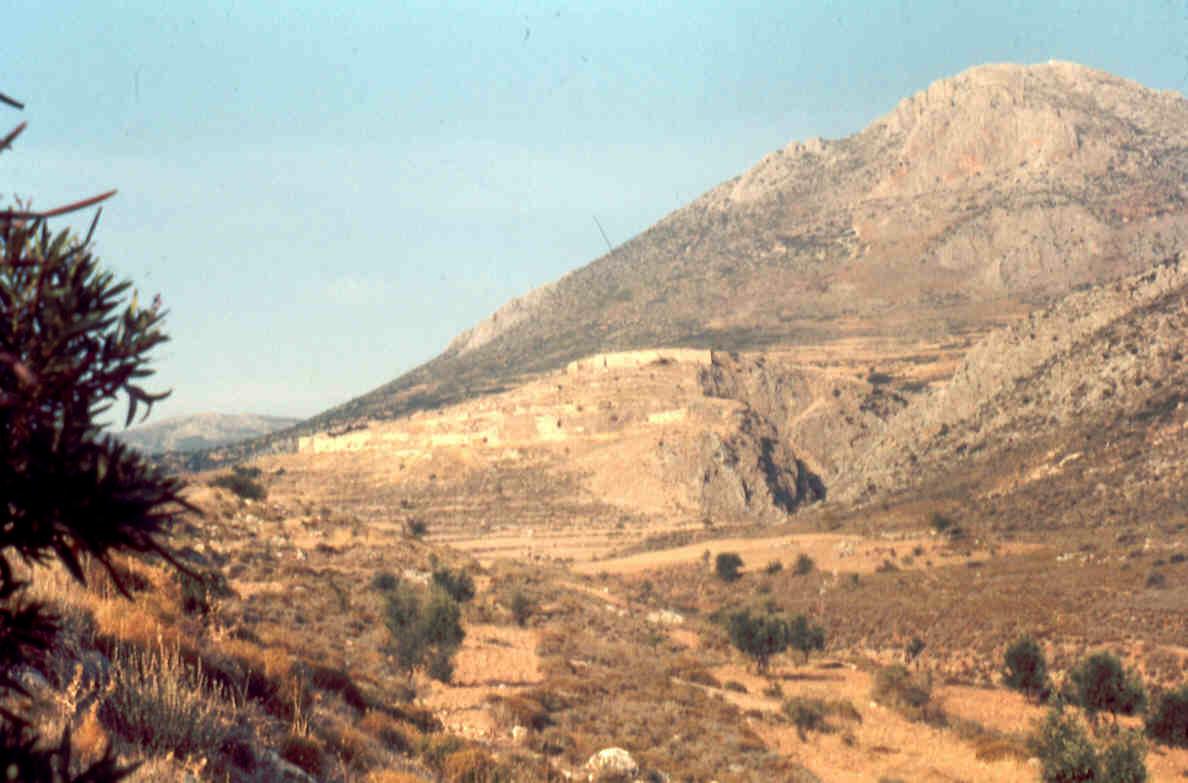
Mycenae at a distance
Miles Hodges
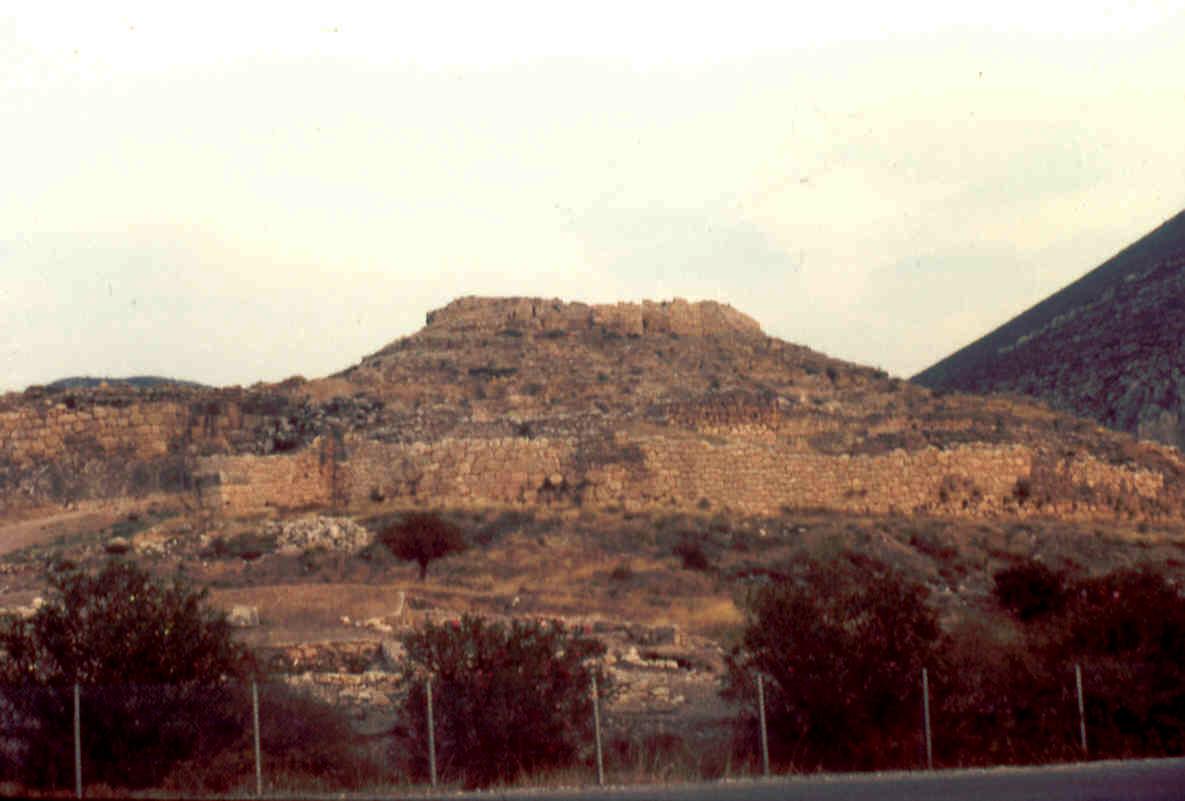
Mycenae
Miles Hodges
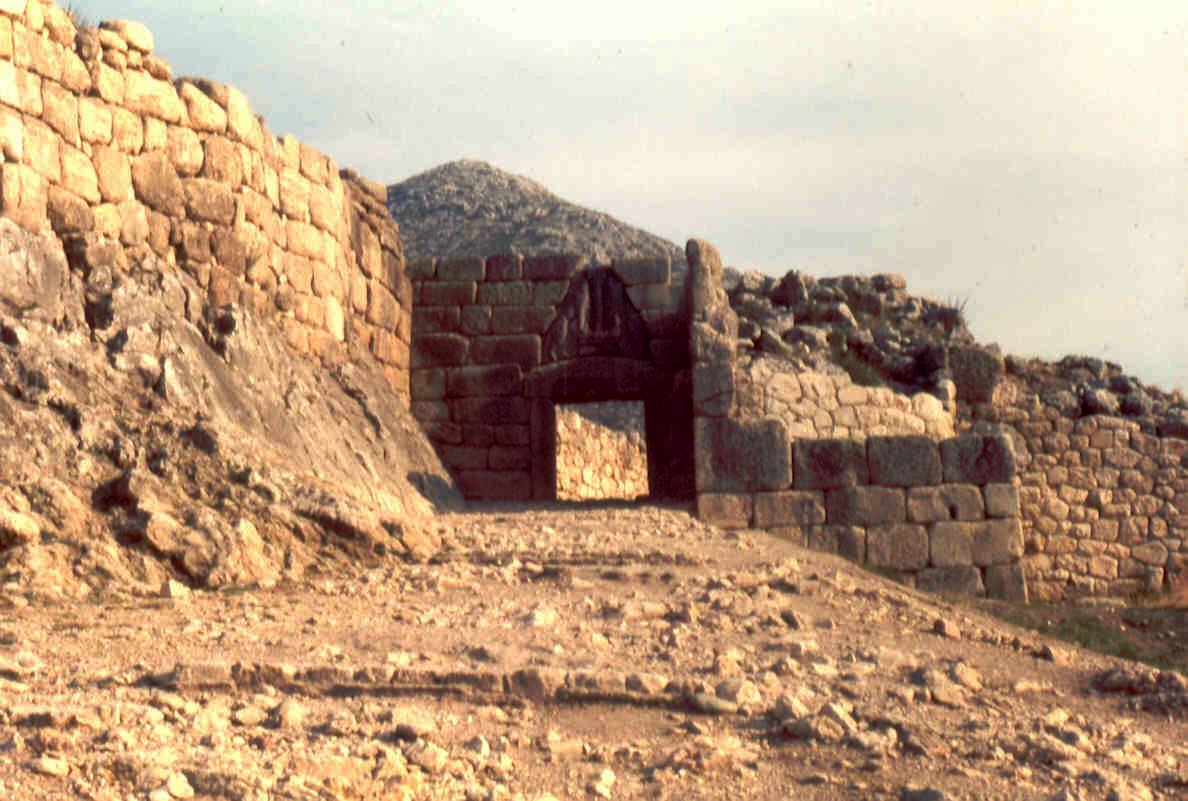
The approach to Mycenae and
the Lions Gate
Miles Hodges
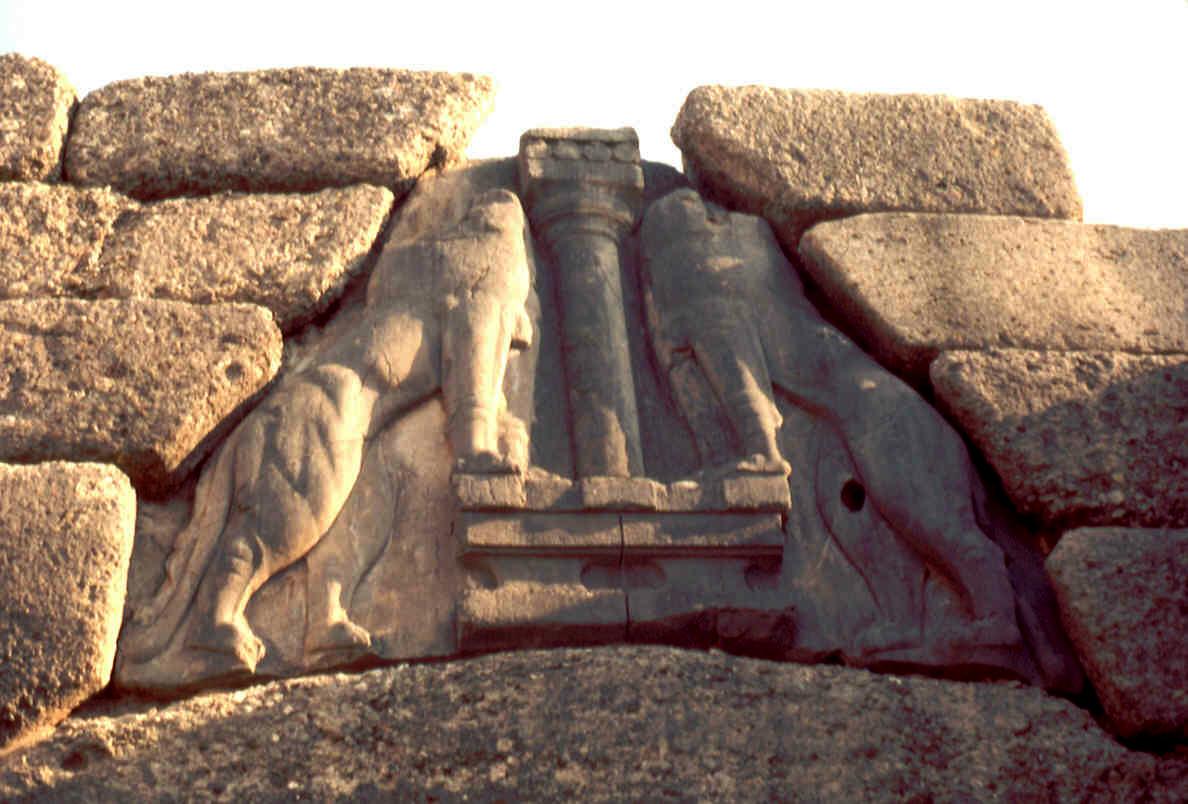
Details of the Lions Gate
Miles Hodges
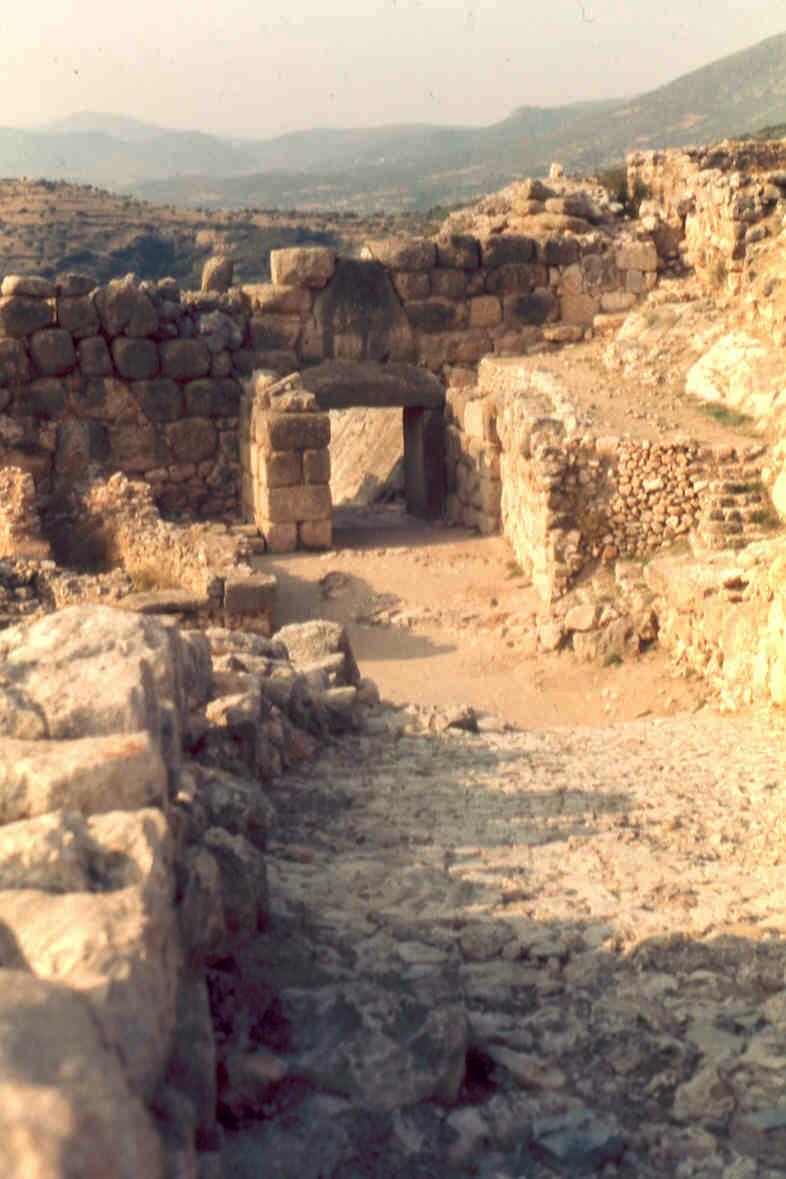
A view of entrance from inside
the walls
Miles Hodges
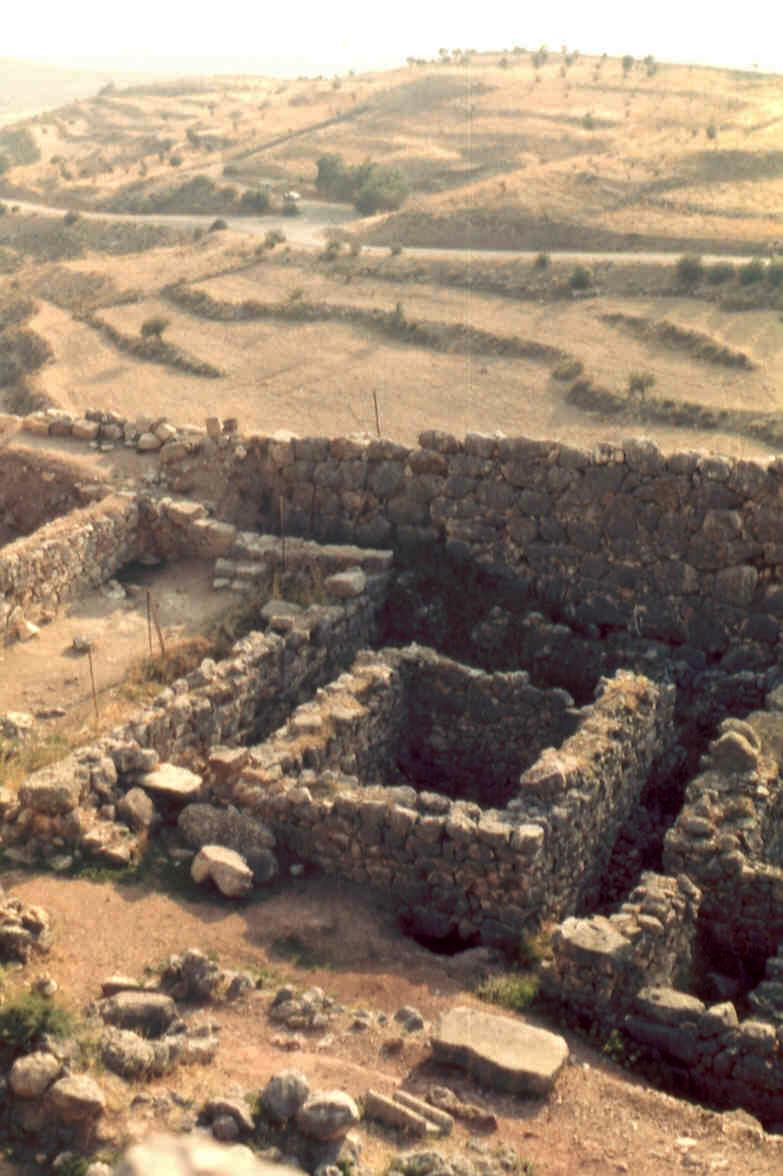
House foundations inside
Mycenae's walls
Miles Hodges
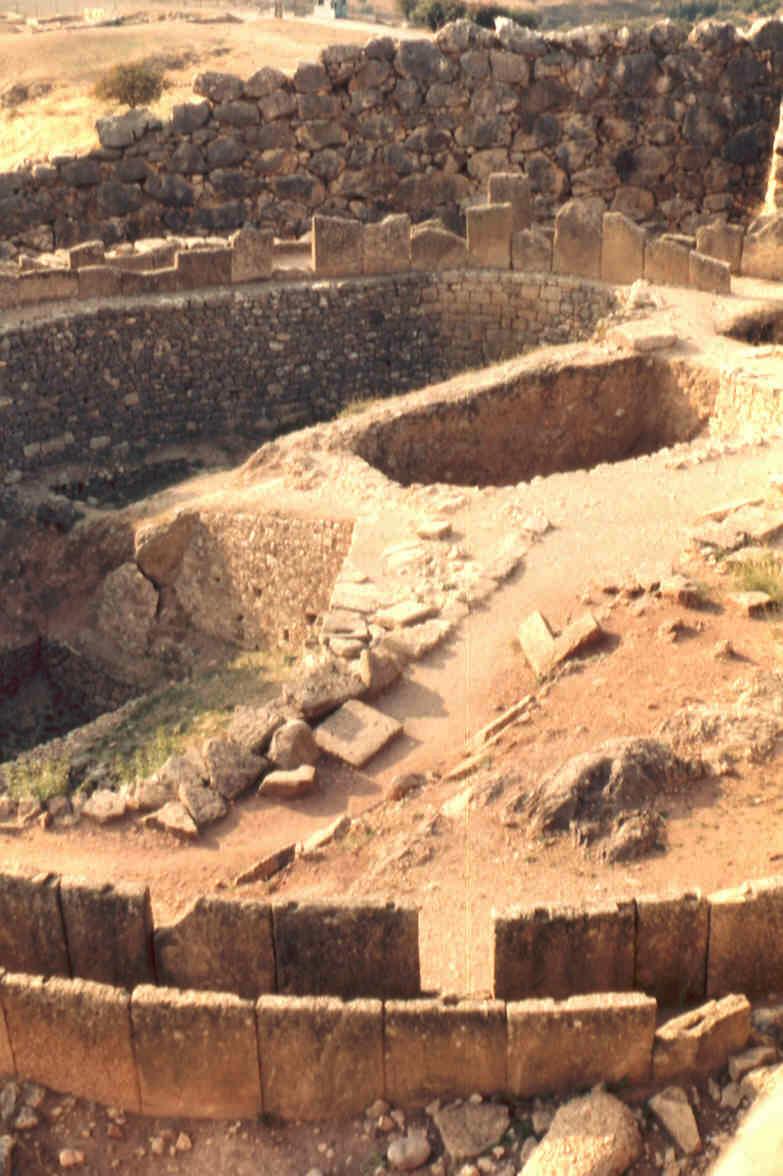
The Royal Tombs
Miles Hodges
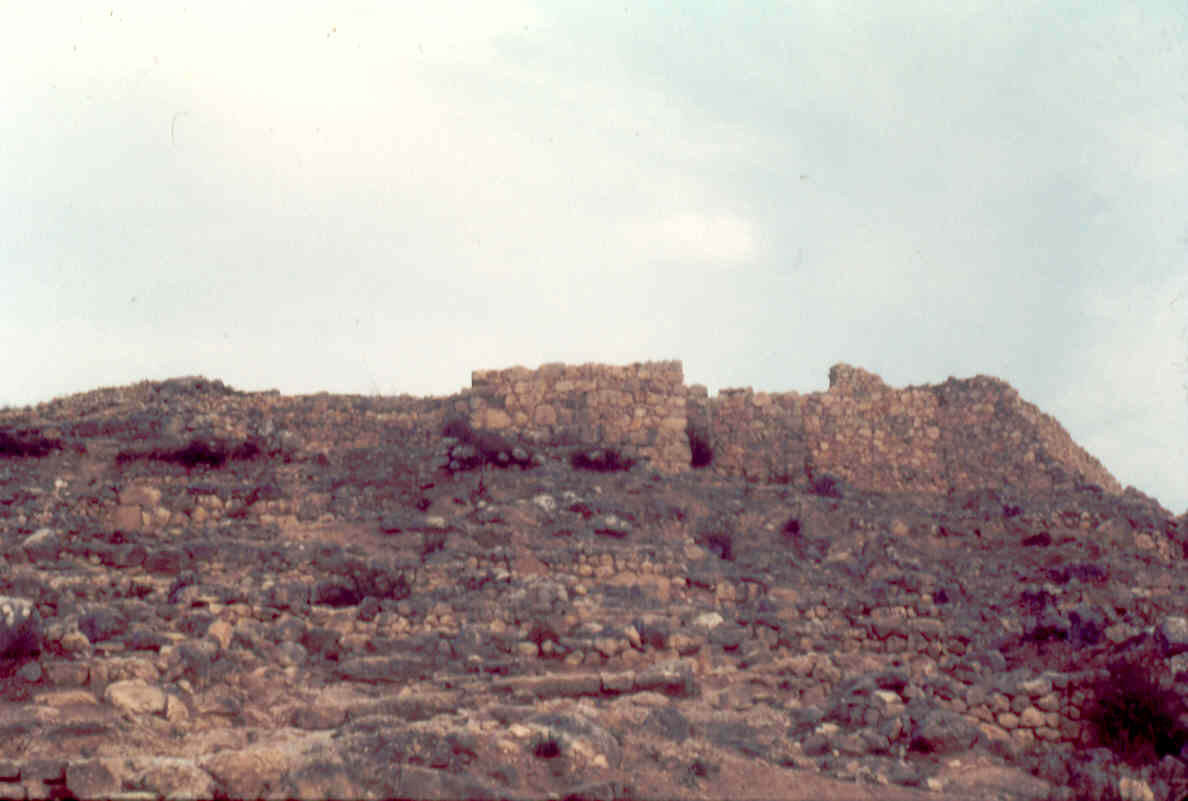
The Citadel at Mycenae
Miles Hodges
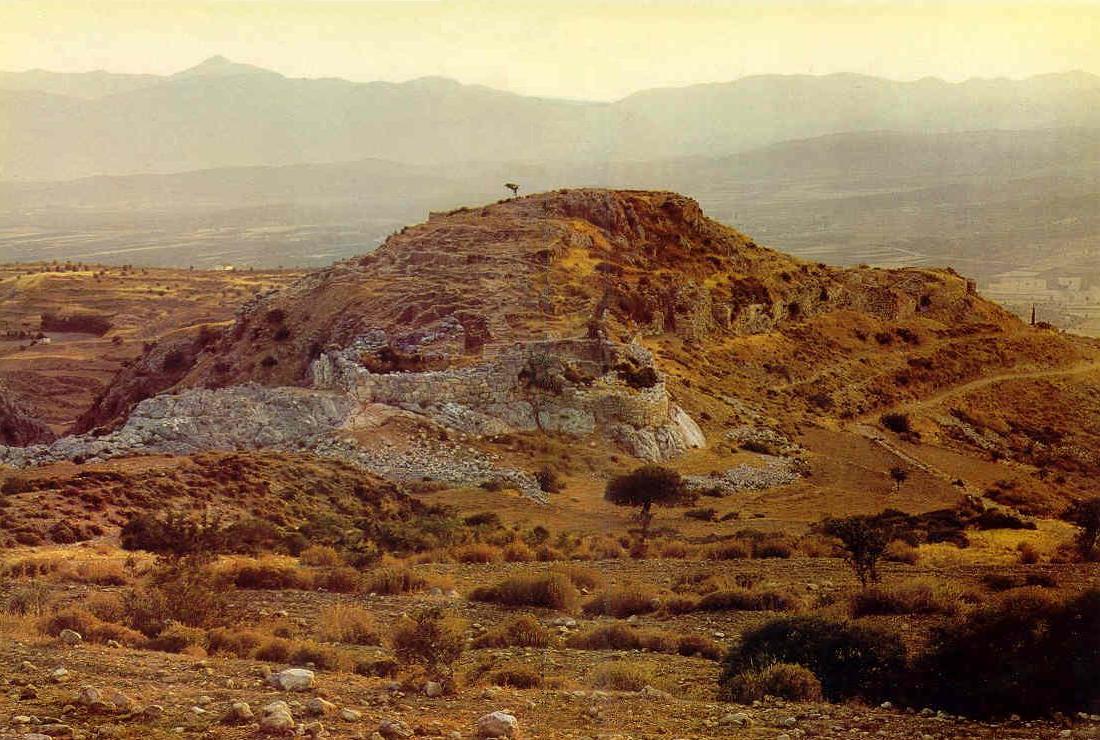
The Citadel at Mycenae
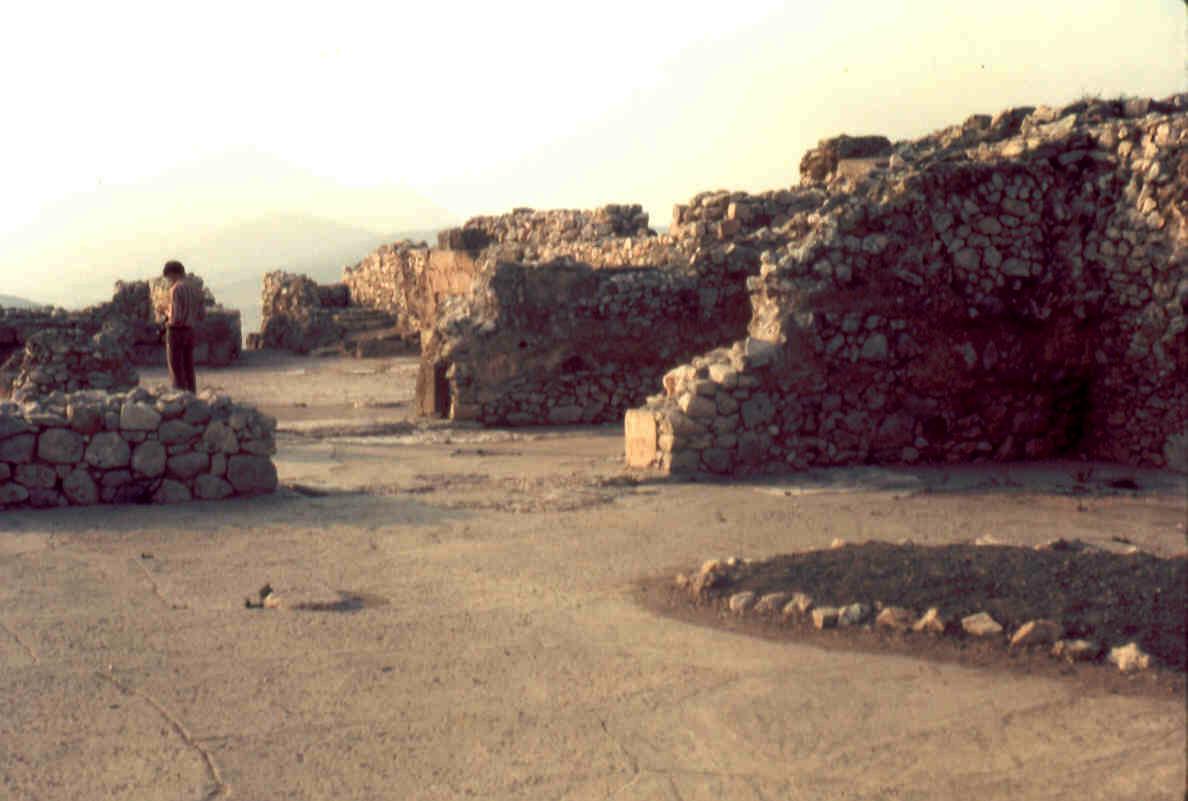
The Citadel at Mycenae
Miles Hodges
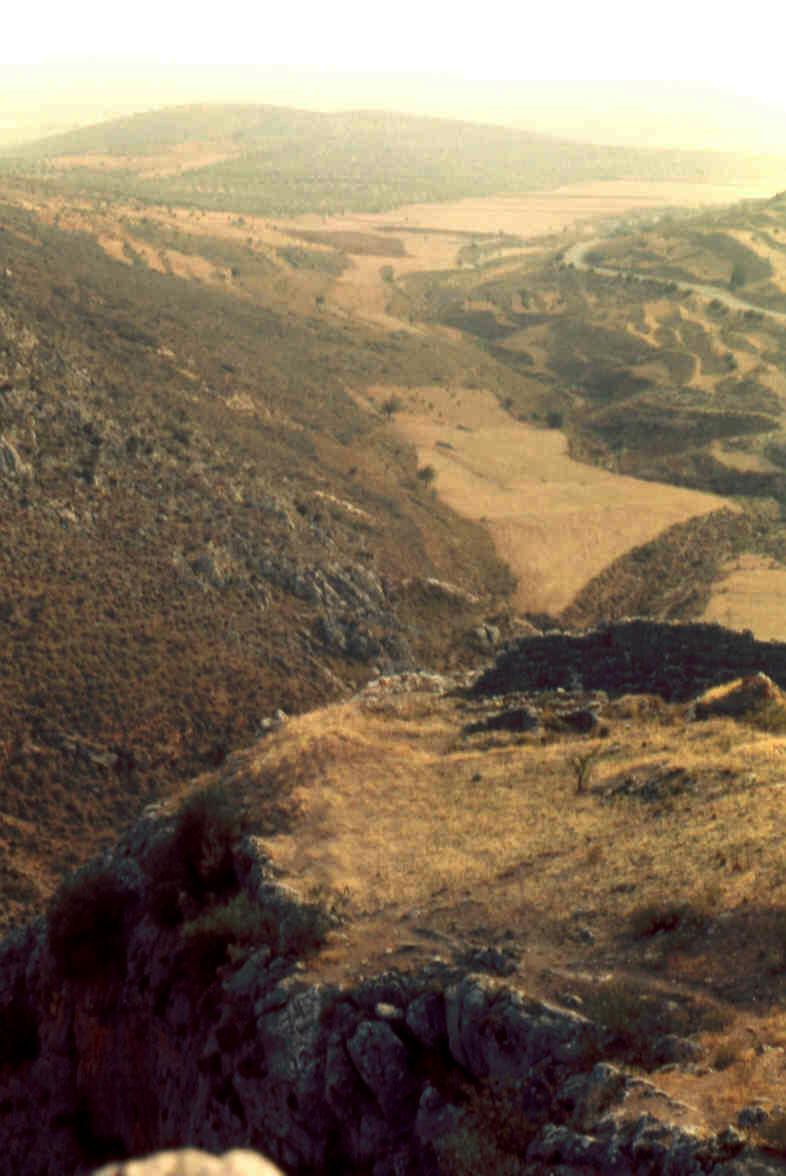
View of the surrounding countryside
from the Citadel at Mycenae
Miles Hodges
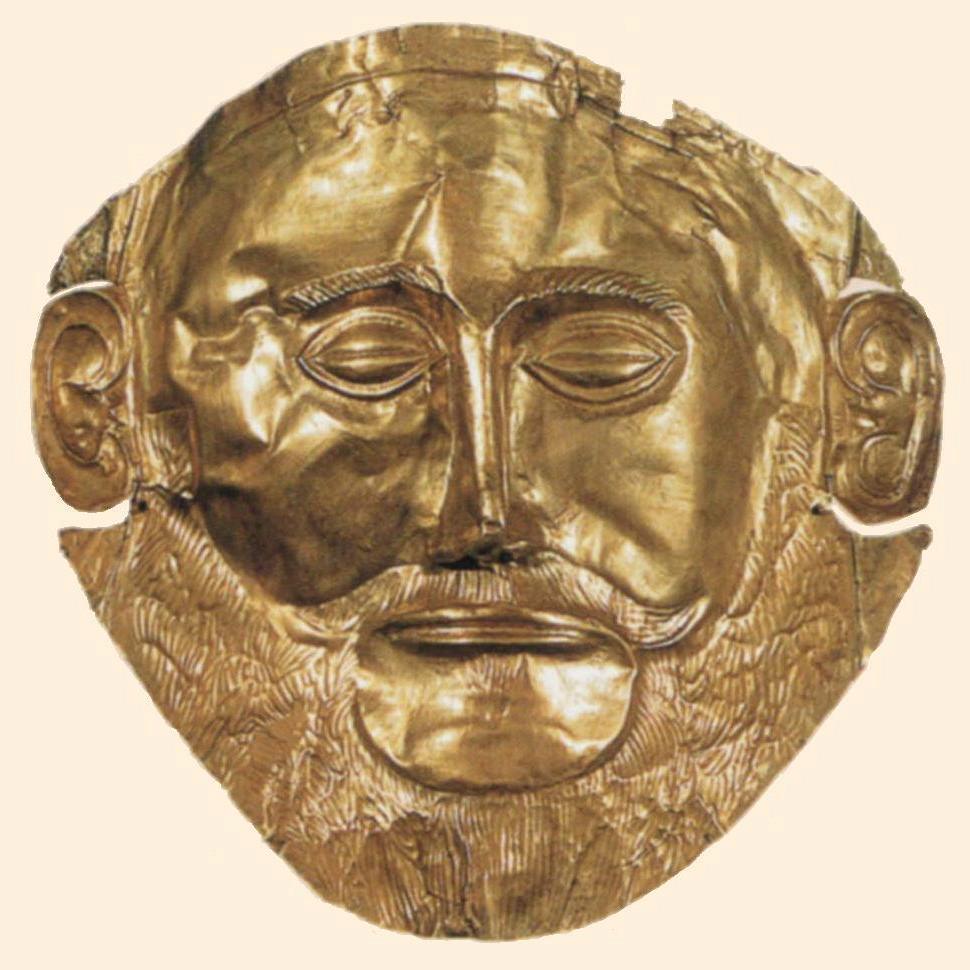
A princely death mask of
gold ("Mask of Agamemnon")
from the Upper Grave Circle at Mycenae - 1500s
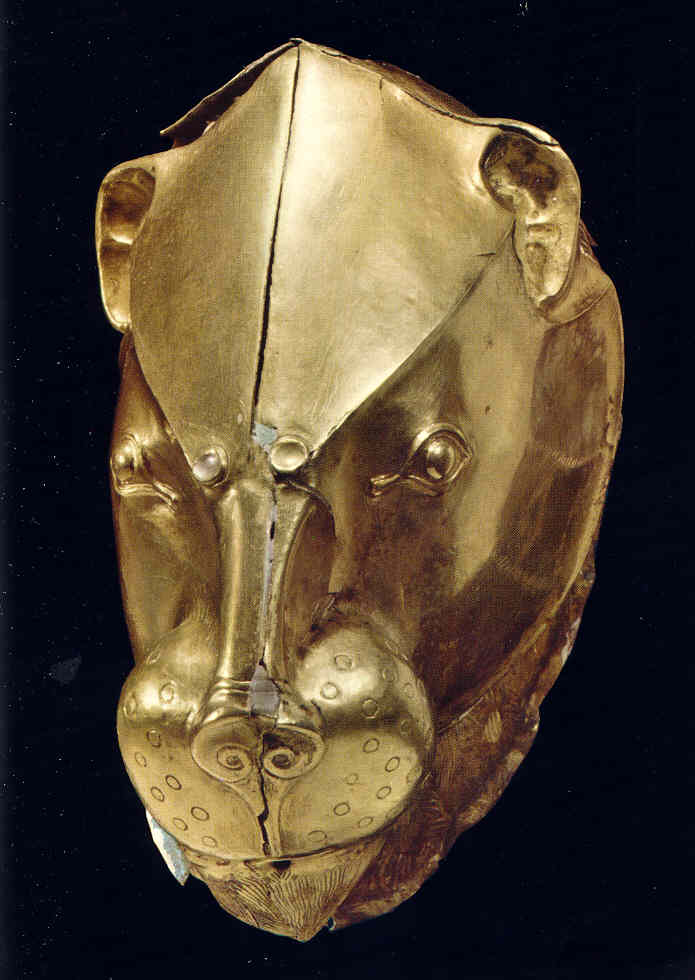
Mycenae – Lion head of thick
plate gold
From the upper grave circle
Athens - National Archeological
Museum
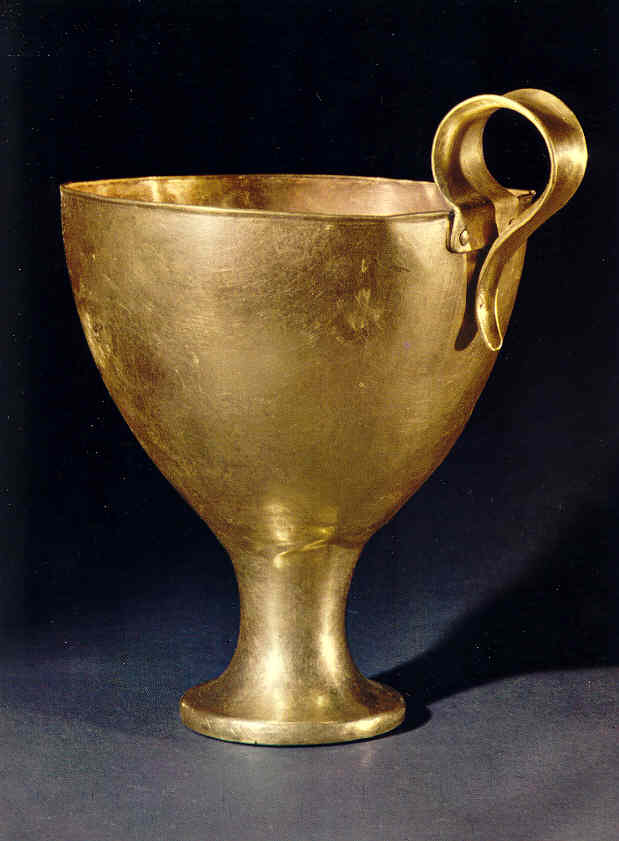
Gold cup from the Upper Grave
Circle at Mycenae, 1500s BC
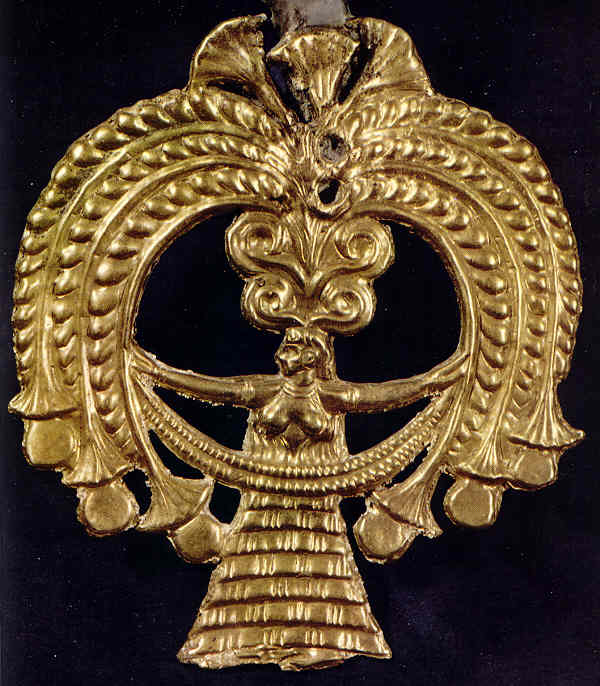
Gold pendant of a goddess – from the women's grave in the Upper Grave Circle,
Mycenae, 1500s BC
Other Mycenaean era sites and archeological findings
Tiryns
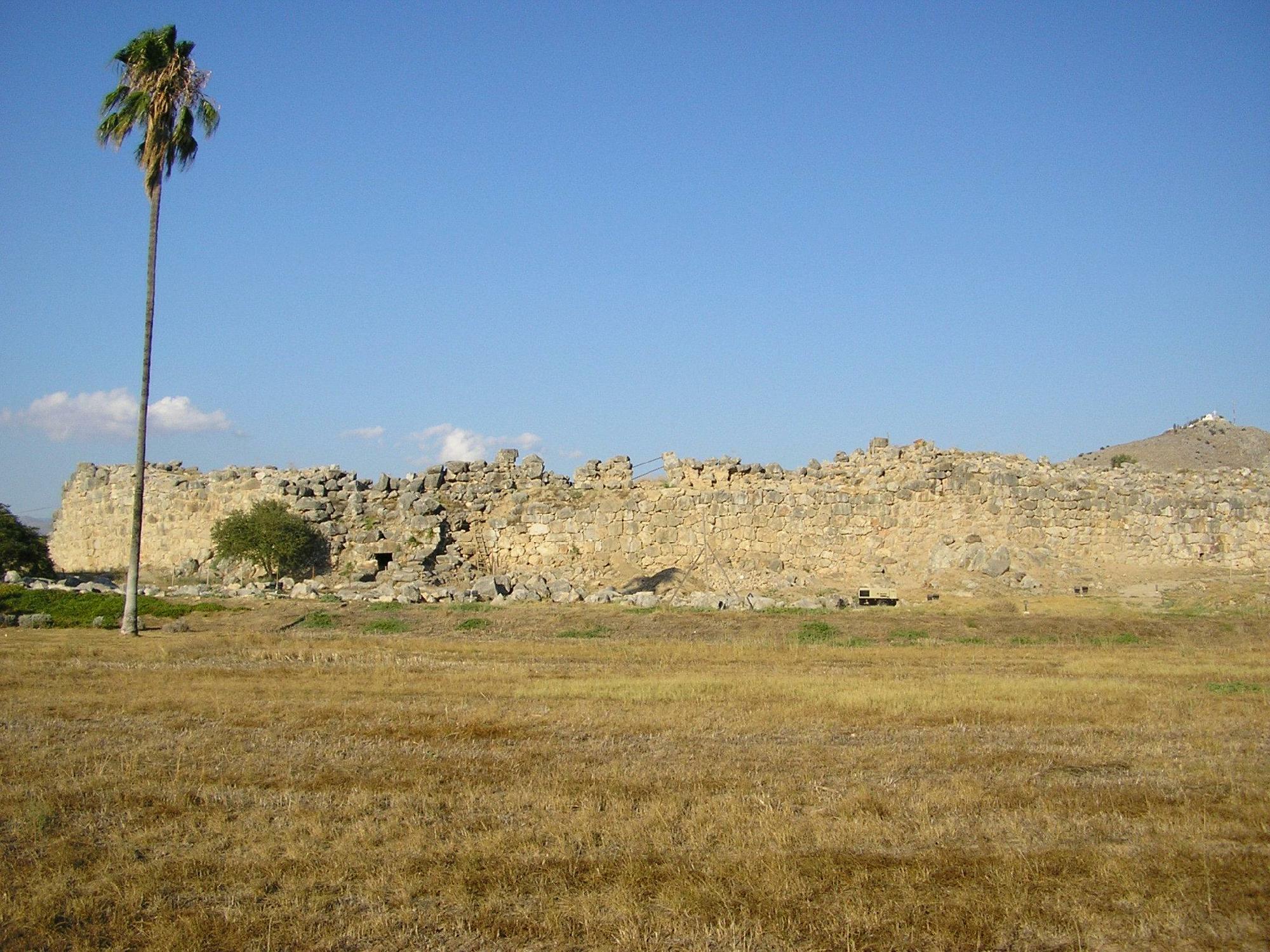
Tiryns – a general view
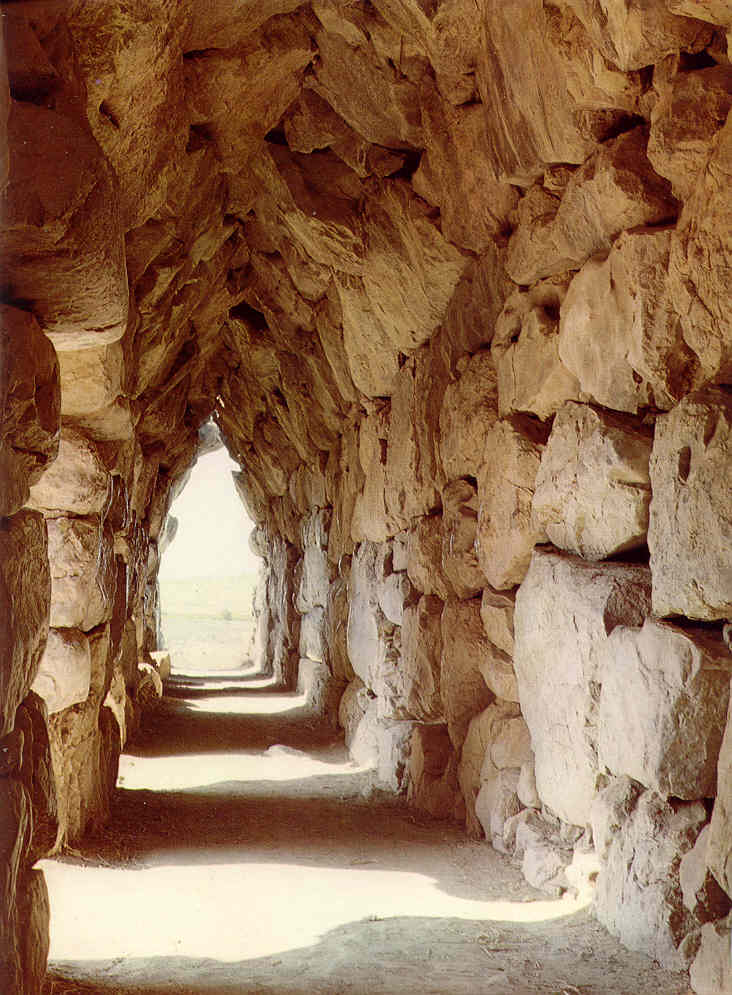
Entryway through Tiryns'
thick walls 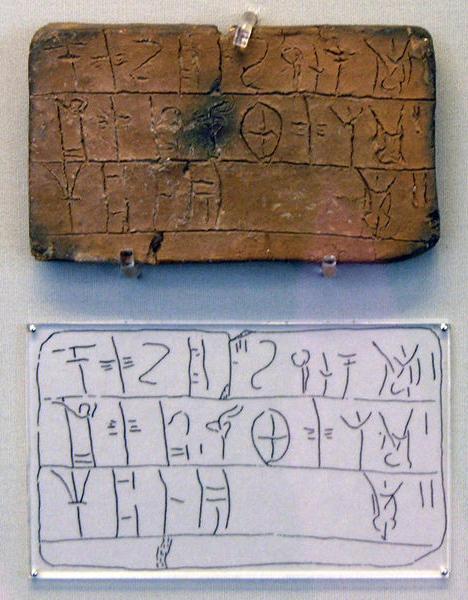
Mycenaean tablet inscripted
in linear B coming from the House of the Oil Merchant
The tablet registers an
amount of wool which is to be dyed
National Archeological Museum,
Athens
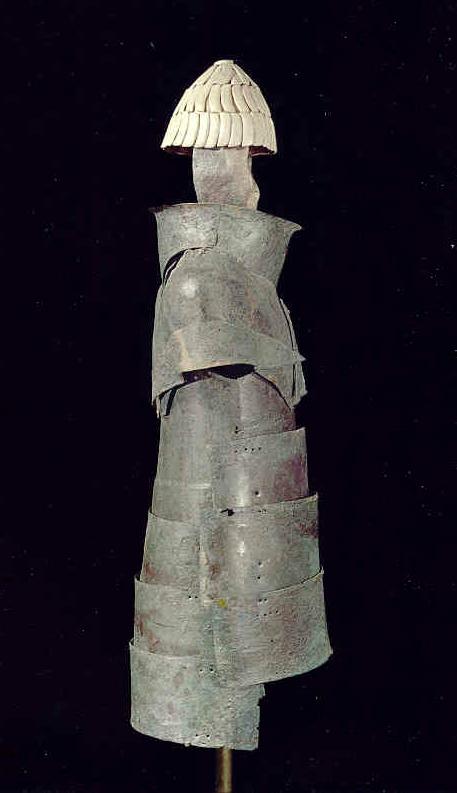
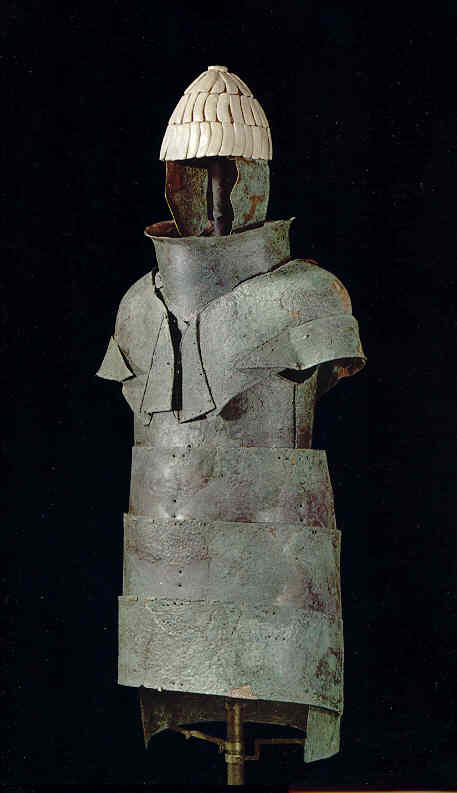
Achaean armor made from boars'
tusks and bronze – 1400s BC
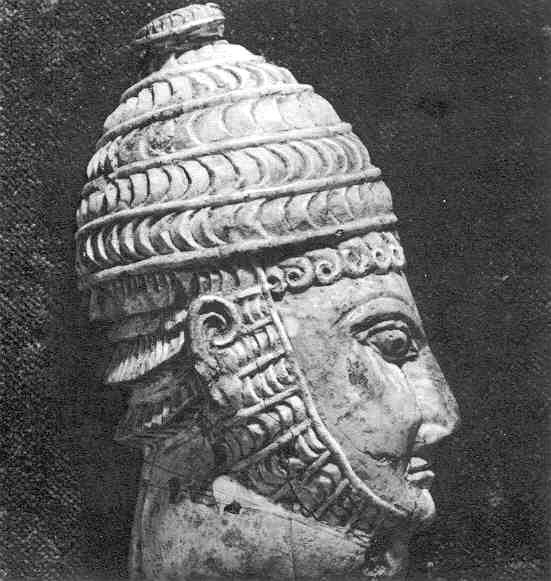
Achaean warrior in boar's-tusk
helmet. Ivory – from a chamber tomb at Mycenae, 1300s BC
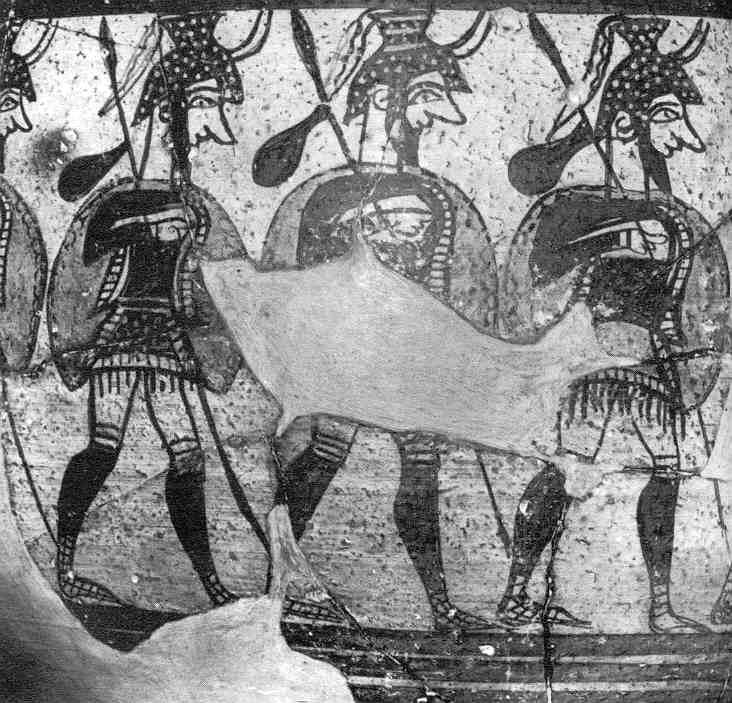
Soldiers marching against
the (Dorian?) barbarians
– from the "Warrior Vase" at Mycenae, 1100s BC
Athens - National Archeological
Museum
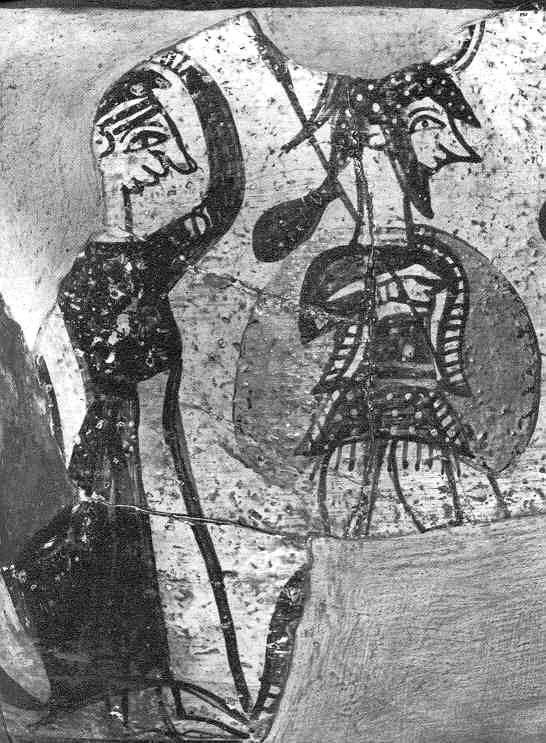
A woman laments the departure
of the soldiers –
from the "Warrior Vase" at Mycenae, 1100s BC
Athens - National Archeological
Museum
|
The Dorians ... and a Greek "Dark Age"
But
this Mycenaean/Achaean strength eventually began to decline, and after
approximately 1150 BC Greek culture fell into a 400 year-long Dark
Age. This was either caused by, or led to, yet another wave of
Greek invaders from the Northeast, the "Dorians." All
archeological evidence seems to indicate that probably (though not
certainly: debate lingers on) the Dorians disrupted life in
Greece in a very major way.
Certainly
the Doric invasion set off a reactive wave of Greek migrations in
around 1000 BC – principally to the shores of western Asia Minor.
Ionians from Attica (around Athens) retreated across the Aegean to the
central western shores of Asia Minor (to Miletus) and gave their name
"Ionia" to this particular region along the Asia Minor coastline.
Aeolians (perhaps a later group of Greeks to appear on the scene)
settled the north western shores of Asia Minor. Dorians
themselves eventually continued their own migration across the Aegean
to the shores of southwestern Asia Minor and then onward to Crete.
In
any case, the warlike Dorians eventually settled themselves into the
Peloponnesian peninsula – where they ruled over the helots, the
enslaved or enserfed Greeks who had originally lived in the area.
Eventually Sparta grew up as the leading city-state at the heart of
Doric culture – famous for the intense military discipline all its
citizens (women as well as men) were put under. But
interestingly, Athens (and its hinterland of Attica) managed to fend
off the Dorians – and retain its older Achaean culture.
Greece's "Archaic Period" (700s – to the late 500s BC)
In
the 700s BC Greece began to experience a commercial revival, growth of
its population – and emergence of political powers in reviving Greek
towns in the form of local aristocracies (rule by the heads of
prominent families). But prosperity also strengthened the power
of the more numerous commoner class, who found champions in the form of
tyrants – who would use their political power to support the political
cause of the Greek lower classes. Political revolutions of sorts
thus shook the Greek world as new prosperity put power in the hands of
all sorts of people. As a result democracy (rule by the common
people or demos) – or something like it – resulted in a number of
cities.
This
rise of the common classes however inspired a strong political reaction
in Sparta, where a small elite of Spartan military citizens, who ruled
over the vast numbers of subject peoples in surrounding towns and
villages, took an ever-tougher stance of rulers over ruled – creating
Sparta's famed military aristocracy.
More Greek colonization around the Mediterranean
With
this economic revival of Greece there was also a large increase in the
population – causing a serious strain on Greece's available farmland to
feed that population. However, the surrounding seas, which the
Greeks viewed not as a barrier but as a source of life (in fact a
superhighway for them to move across), offered them an escape from
their problems. Thus, excess population was sent out to create
new settlements or colonies – extensions of sorts of the sending
cities. A new wave of Greek migration thus developed.
During
the 700s and 600s BC Greeks sailed east and west and discovered lands
that they could colonize with their excess population (much as other
cultures were doing at the time, notably the Phoenicians – located
along the Syrian coast – with whom the Greeks had active commercial
relations).
From
the city of Corinth colonies were established to the West on the island
of Sicily and on the southern Italian peninsula (this would eventually
come to be called Magna Graecia or "Greater Greece"). One of
those colonies, Syracuse (founded in 733 BC), soon became a major city
by its own right. Some of the Euboean towns (just north of
Attica) sent settlers to the Syrian coast. From Miletus and other
coastal towns in Asia Minor (a region known as Ionia) settlers were
sent through the Dardanelles straits into the Black Sea where they then
established numerous Greek towns around the coast. Settlers also
headed south to the Egyptian and Libyan coasts of Africa. Others
sailed west beyond Sicily and established towns along the coast of what
is modern day France (notably at Marseille). By the 500s BC they
were reaching to Spain and northern Italy.
Thus
in the course of the 600s BC "Greece" came to describe an area much
larger than the land we today call Greece. In those ancient days
"Greece" encompassed a whole huge area along the northern half of the
Eastern and central Mediterranean Sea. And if we include the
various Greek cities planted along the coast of the Western
Mediterranean (such as Marseilles in southern France) we are describing
a culture that was very extensive.
Soon
Greek towns along the Western coast of Ionia (Western Turkey) and Magna
Graecia (Sicily and Southern Italy) would achieve tremendous cultural
growth of their own – often surpassing in quality the level of culture
of the sending cities back home.
|
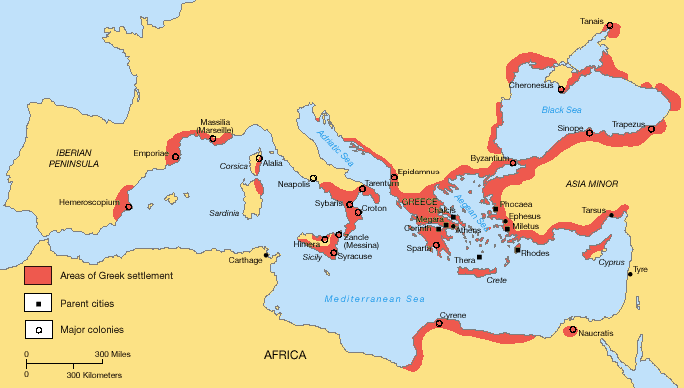
Greek colonization around
the Mediterranean
Wikipedia - "Ancient
Greece"
EARLY PHILOSPHICAL DEVELOPMENT |
The Greek cosmic vision: Materialism versus Mysticism
It
is easy to look to the ancient Greeks for the startup of what we have
come to know as "Western culture." The Greeks were great
thinkers. Although they had started out as much of the rest of
the world with rather neolithic ideas about how events on earth were
regulated by gods and goddesses in the heavenlies above (and in the
depths of the earth below), some of them began to notice a high degree
of order around them, one not so easily explained by the doings of
rather human-like and human-acting gods and goddesses. Greek
thinkers began to explore the possibilities of other things being the
source of this order. Thus Greek philosophy was born. And
thus the Greeks put Western culture on the road to intellectual and
spiritual enquiry – one still very much a part of Western culture to
this day. And it all began so very long ago.
This Greek legacy was so strong that it even influenced deeply the
Roman world that eventually took over the Mediterranean heartland from
the Greeks, and indeed also the Christian society that emerged from the
decline of Rome, and even the modern secular world that would one day
in turn challenge the thousand-year tenure of Christendom. This
legacy would be strongly philosophical and ideological in its early
shaping of the West’s fundamental cosmology or world view – but in the
process would take on not one but two distinct forms: on the one hand
an earthy philosophical materialism … and on the other a lofty
mysticism.
From Chaos to Order.
Greek culture had grown up in a cosmos of rather fickle and often cruel
gods who, from Mount Olympus, called the shots on earth. It was
often a wild and crazy affair – as witnessed in the sagas of Homer in
his works, the Iliad and the Odyssey. But by the 700s BC, the poet Hesiod was describing in his well-received work, Theogony,
an Olympic realm in which the gods themselves lived under some kind of
a divine order – with Zeus as the presiding figure over this order.

For more on The Trojan War, Homer, and Hesiod ... but also Dionysianism and Orphism
Philosophical Materialism.
By the 500s BC a number of Greek thinkers were already dismissing the
idea of human-like gods living atop Mount Olympus directing life on
earth, especially concerning the affairs of the Greeks
themselves. From the Easternmost reaches of the Greek world in
Western Asia (Ionia in modern-day Turkey) to the Westernmost reaches of
the same world in Southern Italy and Sicily, a number of Greek thinkers
or philosophers were reflecting deeply on this matter of a basic order
underlying all creation … an order that seemed to work quite
"naturally" (as in its very nature to do so) rather than as a result of
some kind of Olympian or divine manipulation.
It
is perhaps surprising to note that it was not in Athens or the Greek
mainland, but in the eastern Greek realm of Ionia across the Aegean
Sea, that this program of "natural science" really got underway.
In the Ionian town of Miletus, the well-traveled teacher Thales (c.
624-546 BC) showed his students the power of mathematics and
engineering in the construction of everything from pyramids to
ships. But he was also the first Western philosopher on record
(and thus acknowledged as the "Father" of Western philosophy) to seek
to find the substance that was the source – material in nature … not
spiritual or divine – that was the foundation of all reality. And
he was certain that it was simply the primary physical reality:
water.
His
legacy was then picked up by Anaximánder (most probably a student of
Thales) and then carried forward by Anaximander's student
Anaximénes. Anaximander (c. 610-547 BC) claimed that it was the
balance of forces inherent in all matter (cold v. hot; wet v. dry) that
formed the underlying dynamic moving all of life forward. Then
Anaximenes (mid-500s BC) went back to Thales' single-substance theory …
except that he claimed that it was pneuma
(breath or spirit) that was the primal material and the source of all
life. But according to Anaximander, pneuma could take on mass,
even take the form as fire, as well as form the foundation for all material
substance.
And thus the "Miletus Triad" opened up the materialist pathway for
Greek philosophy to take. Thus these materialistic philosophers
were early forerunners of our modern scientists – with this same
tendency to look to the material order for answers to the "natural"
structure and dynamics of the universe.
According to these early philosophers, Greek gods had no role to play in the dynamics of life.
 For more on The Miletus Triad For more on The Miletus Triad
Pythagoras of Samos (c. 570 to c. 480 BC)
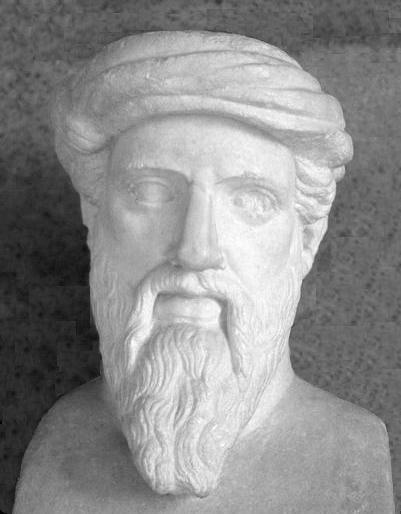 But
the materialism of the Miletus school was answered by another
individual located on the opposite side of the Greek world – in
Southern Italy at Croton. Today he is remembered for his skill in
the field of mathematics … for instance, the discovery of the
"Pythagorean Theory" of the dimensions of a right triangle, his
discovery of the mathematical rules for the musical harmonies or
scales; his assurance that the sun, moon and earth - as well as the
universe itself – are all perfect spheres. But
the materialism of the Miletus school was answered by another
individual located on the opposite side of the Greek world – in
Southern Italy at Croton. Today he is remembered for his skill in
the field of mathematics … for instance, the discovery of the
"Pythagorean Theory" of the dimensions of a right triangle, his
discovery of the mathematical rules for the musical harmonies or
scales; his assurance that the sun, moon and earth - as well as the
universe itself – are all perfect spheres.
But unlike the Miletus School of Materialist philosophy,2
Pythagoras was noted for being a mystic … even of the Orphic school –
rather than a materialist. Unfortunately, it is hard to say what
his cosmological beliefs actually happened to be … because he worked
with his students in mystic secrecy … although elements of his thinking
slipped out publicly so that we can see that he was an exceptional
philosopher in the mystic category as well.
We know that his philosophy was closely related to Orphism3
… although we can't tell whether Orphism impacted him greatly – or he
impacted the Orphic school greatly. But certainly, the Orphic
mysteries became much more sophisticated in his days … a Greek
philosophical development for which Pythagoras is probably greatly
responsible.
As a mystic he looked beyond the mathematical precision of the world
that so fascinated the Materialists … in the search for the higher
causes of such precision. Certainly this mathematical precision
underlying all physical reality was not achieved by accident … but had
a much higher cause – some divine force behind it all. It was to
this higher realm that Pythagoras was certain that we needed to direct
our search … in order to better understand reality.4
 For more on Pythagoras For more on Pythagoras
2With
Pythagoras actually growing up on the island of Samos just opposite
Miletus, it is even probable that he was once a student of
Anaximander's.
3Orphism
shared many features in common with another worship form found further
to the East: Hinduism. Orphism developed a theology of
reincarnation and transmigration of the souls through endless cycles of
birth, growth, decay and death – in which escape from the grip of this
eternal dance was the desired goal of the Orphic devotee (as with
Hinduism's offshoot, Buddhism).
4Einstein’s
discovery of the shockingly simple mathematical relationship between
all matter and all energy, E=mc2, would have greatly excited
Pythagoras. In fact to call Einstein a mystic would not be inaccurate
at all! He and his scientific friends often engaged in
discussions about the precise nature of the Lord God!
The challenge to unite the Materialist and Mystical cosmologies
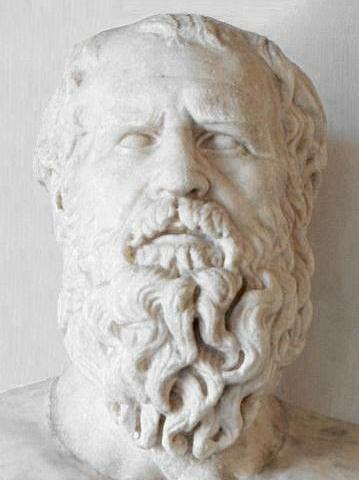 Heráclitus
(c. 500 BC) was another Ionian … who certainly had his foundations in
the Ionian Materialist camp but who was also interested in exploring
the higher dynamic behind all reality. As a Materialist, he
concluded that fire was the primordial element of life … even though it
is not a "thing" but merely a life process we are presently
observing. But as something of a Mystic, he also believed that
life is actually a dynamic in which divided forces governing physical
reality are always seeking to recover full unity with the higher order
or Logos from which they were
once separated. Unity with the Logos is thus that higher order or full
reality to which we should ourselves seek to be rejoined. Heráclitus
(c. 500 BC) was another Ionian … who certainly had his foundations in
the Ionian Materialist camp but who was also interested in exploring
the higher dynamic behind all reality. As a Materialist, he
concluded that fire was the primordial element of life … even though it
is not a "thing" but merely a life process we are presently
observing. But as something of a Mystic, he also believed that
life is actually a dynamic in which divided forces governing physical
reality are always seeking to recover full unity with the higher order
or Logos from which they were
once separated. Unity with the Logos is thus that higher order or full
reality to which we should ourselves seek to be rejoined.
Interestingly,
Christians would later identify that same Logos as the dynamic
"Word" of God from which all things in creation were originally derived
… but also a Logos which came to earth in the form of man (Jesus) to
live among us in order to show us the way back to that unity with the
Creator himself, our heavenly Father.
Ultimately
however, the Materialists came to some kind of agreement, thanks to
Empédocles (mid-400s BC), that reality was made up of four elements –
earth, air, fire and water – which combine in different ways to shape
the physical world.
Of
course the Materialists would still find the one most important
question in life to be also the most difficult question to
answer: where did all of this material order come from?
Parménides (early 400s BC) answered the question by affirming that the
question itself was an absurd one … because something could not just
come out of nothing. Reality always is … and has always
been. That thus supposedly answered the question.
But
another Ionian philosopher, Anaxagóras (mid-400s BC) would not stop
with that conclusion. Being from Ionia, he was quite naturally a
Materialist. For instance, he saw the sun as an enormous red-hot
stone … and the moon as merely reflecting the sun's light. But he
had some Mystical instincts as well …holding the view that the Eternal
Mind (the Nous) gave life its beginning … and continued to shape and activate all life.
And very importantly for Athens, he left Ionia and moved to that city
to do his study and teaching … helping to start up Athens as a major
intellectual as well as political center.
Democritus of Abdera (ca. 460-370 B.C.)
the creator of Atomic Theory
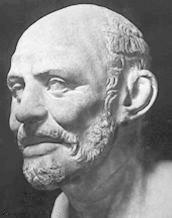 Another
Greek Materialist, Demócritus (c. 450-370 BC), would take Greek
philosophy its furthest down the Materialist path. He was widely
recognized even in his own days as a brilliant thinker … who brought to
the ancient Greek world the atomic theory of the cosmos.
Basically, his view was that all life is merely the composite structure
of invisibly minute particles of hard matter: atoms (from the Greek
atomos meaning "not divisible"). These atoms – eternal in their
being – are structured into the more visible material entities we
observe in our world – through the laws of motion – also eternal in
their existence. Another
Greek Materialist, Demócritus (c. 450-370 BC), would take Greek
philosophy its furthest down the Materialist path. He was widely
recognized even in his own days as a brilliant thinker … who brought to
the ancient Greek world the atomic theory of the cosmos.
Basically, his view was that all life is merely the composite structure
of invisibly minute particles of hard matter: atoms (from the Greek
atomos meaning "not divisible"). These atoms – eternal in their
being – are structured into the more visible material entities we
observe in our world – through the laws of motion – also eternal in
their existence.
Democritus was also a profound materialist in his view of human
life. To him life is simply patterns of motion of these soul-less
atoms – operating in accordance with equally soul-less
laws. The human soul itself is simply a brief pattern in
the working of the atoms – a pattern which forms in the human womb,
developing, and then breaking down over a human lifetime … until it
simply ceases to exist when we draw our last breath.
To Democritus there was no such thing as eternal life. Likewise,
God or Divinity was to him simply a construct of human thought – and
had no real existence in the cosmos.
Thus in so many ways Democritus anticipated – by thousands of years –
the direction modern secular science would take in its development with
the modern rise of post-Christian Western culture and society!
 For more on Democritus For more on Democritus
Greek Materialists vs. Greek Mystics
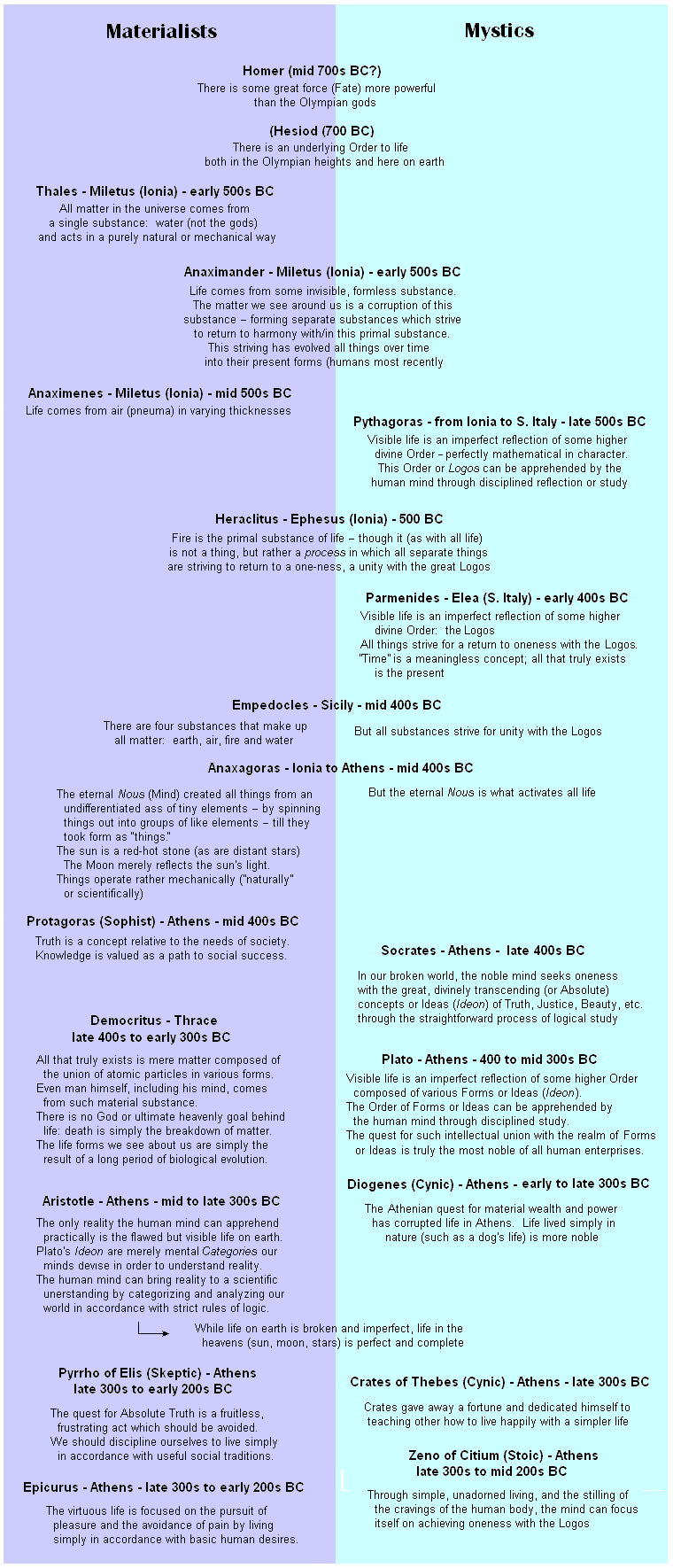
|
Greek democracy
The Greeks were also a people given to much thought about the best way to shape, run, and occasionally reform Greek society.
All
Greeks originated as proud tribal peoples, complete with their tribal
assemblies that all men were expected to attend ... for their services
would be frequently called on and it was best that they personally had
"bought into' the social decision, especially on the matter of war, in
order to assure their commitment to the cause. And out of this
experience grew the idea of the people governing themselves. Each
tribe, even when it grew in number and became "civilized" (meaning the
people now lived in cities with temples, commercial buildings,
apartments, town walls, etc.), saw itself as practicing "democracy" –
government (kratos) by the citizens (demos) of the towns or cities themselves.
However
the definition of demos or citizen was not as broad as it is today.
The category "citizen" by no means included all inhabitants of the
city-states but only those males of a recognized tribal pedigree ...
meaning full members by birth of one or another of the old tribes
originally making up the community. Foreigners or xenoi living in the
cities – which often included a huge number of the industrial or
commercial workers (and certainly also the many slaves) – were actually
quite numerous in Greek culture. These individuals did not qualify for
democratic privileges ... even if they were descendants of several
generations of xenoi living and working in these "democratic"
city-states.
Athenians and Spartans.
Leading the way in this democratic development was the city-state of
Athens. But the path by which Athenian democracy would develop was
very, very stormy ... just as was the rise to political prominence of
Athens itself.
During most of Greece's Archaic Period the Spartans had been considered the dominant political power or hegemon
in Greece. But during the 500s BC Athens, which was well positioned at
the center of this huge Greek world, and possessing a number of natural
advantages (a very strong citadel, a wide fertile region surrounding
it, and closeness to the sea), soon rose to its own prominence. Also,
having the strongest navy of all the Greek city states (thanks to its
political leader Thucydides), Athens was early looked to in order to
provide leadership in organizing the city states into a great Greek
navy, one designed to keep the Persians away from Greek shores. But
the Athenians proved themselves as well on land as foot soldiers.
Thus
Greek leadership was divided between — and often competed for — by both
Sparta and Athens (Corinth and Thebes were also powerful, though only
at a secondary level).
Athens' struggle to secure
democracy
But
Athens was wracked by internal problems. Athens' rich and powerful
aristocracy, long used to dominating Athens' political and economic
life from its political council, the Areopagus, found itself
increasingly challenged by the Athenian commoners (not really all that
common, since they still occupied a much higher status than the more
numerous xenoi ("foreigners") in Athens and the even more numerous
slave portion of the Athenian population).
The
aristocrats first attempted to control Athens' affairs with a very
tough legal code or constitution (in which the penalty for a wide range
of offenses was death) laid down by Draco (ca. 620 BC) – and thus very
"Draconian" – which, though an improvement over the older oral laws and
traditions, still did not satisfy the political desires of the
commoners. However his constitution did provide for the creation of a
Council of Four Hundred, its members drawn from the commoners by lot.
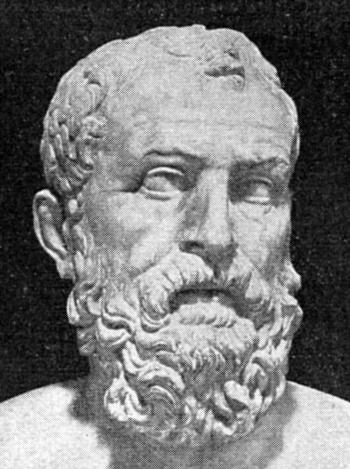 A generation later, in the early 500s BC, another aristocrat, Solon,
serving as archon (one of several leaders governing Athens), was
commissioned to reform this constitution. He attempted to find a
compromise between the contending social classes by ranking the
citizens into four classes and giving each of them a certain number of
economic and political duties and rights. But soon after his departure
from power, class rivalries gradually returned. Peisistratus, a nephew
of Solon, seized power on behalf of the poorer citizens, thus becoming
"tyrant," actually meaning at the time "champion of the poor." His
political base was never secure and he was in power – and exiled –
frequently from 546 to 527 BC as political confusion continued to grip
Athens. A generation later, in the early 500s BC, another aristocrat, Solon,
serving as archon (one of several leaders governing Athens), was
commissioned to reform this constitution. He attempted to find a
compromise between the contending social classes by ranking the
citizens into four classes and giving each of them a certain number of
economic and political duties and rights. But soon after his departure
from power, class rivalries gradually returned. Peisistratus, a nephew
of Solon, seized power on behalf of the poorer citizens, thus becoming
"tyrant," actually meaning at the time "champion of the poor." His
political base was never secure and he was in power – and exiled –
frequently from 546 to 527 BC as political confusion continued to grip
Athens.
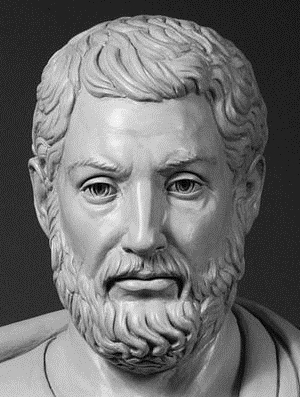 Eventually
a compromise was achieved (509 BC) – in no small part due to the need
to secure unity in the face of the political threat posed by both
Sparta and Persia. A popular politician named Cleisthenes
was elevated to power to reform the constitution. He reorganized the
tribal basis of Athenian citizenship from four to ten tribes –
membership based no longer on class but on residence in the city. From
these tribes were drawn (by lot) members of the all-important
legislative and judicial councils. He saw this not so much as
"democracy" as isonomia: full legal equality of all (male) citizens. Eventually
a compromise was achieved (509 BC) – in no small part due to the need
to secure unity in the face of the political threat posed by both
Sparta and Persia. A popular politician named Cleisthenes
was elevated to power to reform the constitution. He reorganized the
tribal basis of Athenian citizenship from four to ten tribes –
membership based no longer on class but on residence in the city. From
these tribes were drawn (by lot) members of the all-important
legislative and judicial councils. He saw this not so much as
"democracy" as isonomia: full legal equality of all (male) citizens.
The challenge of the Persian Wars
In
the latter part of the 500s BC, just as a number of Greek towns were
beginning to grow in power as "city-states," the Persians surprised the
world by conquering Mesopotamia, Syria, Egypt … and Greek Ionia.
Thus was the mighty Persian Empire born. This was the first time
ever that nearly the whole of the Near East had been brought under a
single rule.
Some
of the Greeks living in Ionia did not particularly take well to this
Persian domination (though others did, even serving in the Persian
military) and rose up in revolt against Persian rule in the 490s
BC. The citizens of Athens were quick to back the Ionian rebels –
who, however, were eventually forced back under Persian rule.
This
action of Athens and other Greek city-states in supporting the Greek
Ionian rebellion drew the wrath of Persia … and led to a Persian desire
to crush any further Athenian or other Greek "meddling" in Persian
affairs. Thus the Persian Greek wars began.
This
Persian response to Greek "meddling" in turn forced the two leading
Greek city-states, Sparta and Athens, into cooperation (in fact forcing
a general Greek unity among all the Greek cities that had previously
been lacking).
The Battle of Marathon (490 BC).
Quite surprisingly (to the Persians, anyway!), in a number of major
encounters, the Greeks succeeded in defeating the Persian armies and
navy sent to Greece, thus not only helping to secure Greek freedom, but
elevating Greece – and in particular Athens – to a new status
politically.
In the first encounter, Athenian hoplites (troops) were able to
surround, attack directly, and completely rout the Persian troops that
had just arrived by sea at the Greek coast at Marathon (the Spartans
were no help in this engagement, claiming to be deeply involved in a
religious ceremony at the time). The Persian survivors (they lost over
6,000 troops, in contrast to Athens' loss of 190 troops) retreated to
Asia, where they prepared themselves for a second attempt.
However, a revolt in Egypt against Persian domination delayed that
second attempt.
The
Persian king Xerxes, who took over when his father died in 486 BC, was
as dedicated to the reduction of Greece, and the total destruction of
Athens. After having crushed the Egyptian revolt, and after
three-years of military preparation, Xerxes was finally ready to
undertake just such a mission. However, Sparta now joined Athens
in the effort to fend off the Persians. But most of the other
Greek city-states still chose to stay out of the action.
Setbacks at Thermopylae and Artemisium (480 BC).
The Persians now approached Greece both by land and by sea, with the
first encounter taking place at a narrow pass at Thermopylae, along the
eastern coastal road in Thessaly (northern Greece). A small group
of Spartan-led troops were able for three days to hold off the invading
Persians, before a Greek traitor showed the Persians a path around the
pass, and the Greek troops were ultimately surrounded and slaughtered
there.
At
the same time the Athenian-led Greek fleet managed to fight off the
Persian fleet at Artemisium, until news of the Greek defeat broke the
Greek spirit and the Greek fleet withdrew to Salamis. The
Persians then continued their advance through Greece, destroying
city-state after city-state as they went, including the city of Athens
as well.
The battles at Salamis (480 BC) ... and Plataea and Mycale (479 BC). But the
Persians were blocked at the narrow isthmus that opens the huge
Peloponnesian peninsula to the rest of Greece, and thus Xerxes decided
that a victory at sea would be required to finish off the Greek
resistance. But under the brilliant leadership of the Athenian
general Themistocles, the Greek navy was able to gain a very decisive
victory at Salamis over the Persian navy.
The
next year, Xerxes was ready to try again to conquer Greece, and sent
his troops to Greece, where they assembled at Plataea. A battle
which then took place there did not go well for the Persians, who lost
their commanding general and then found their camp surrounded, and
ultimately destroyed by the Greek hoplites. At the same time,
another sea battle – at Mycale – did not go well for the Persian fleet,
making the Persian defeat even more obvious.
These were horrible setbacks for the Persians, ones they would never recover from – at least in their dealings with the Greeks.
Yet
for the Greeks it proved to be a major turning point in the history not
only of Greece but even of Western civilization itself. From this
point on, Greece, led most importantly by Athens, would leave a deep
political, social, intellectual and moral impact on Western
civilization … one that would shape that civilization not only in the
many centuries of Greek political and cultural greatness, but even down
to today, where that same legacy is built deeply into the ways of the
West.
|
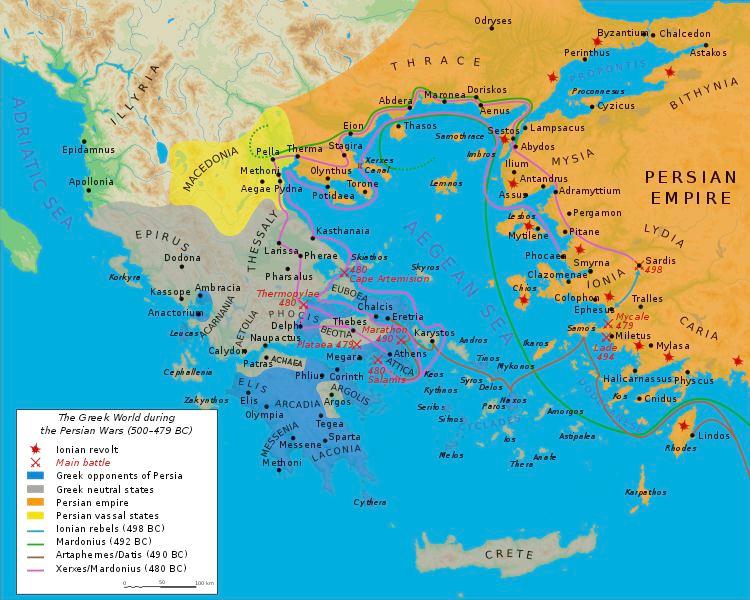
|
The Golden Age of "Periclean
Athens" (and Greece)
The Delian League.
By the mid-400s BC Athens was the dominant sea power in Greece, Sparta
the dominant land power. But the sea was the more important
element in Greek life at that time – and thus Athens naturally tended
to dominate Greek affairs. In fact, although the Persians had
been twice defeated by the Greeks, their shadow continued to loom over
Greek thinking – and thus Greek defenses stood always at the ready,
headed up primarily by Athens which had organized a number of Greek
cities into a defense organization known as the Delian League.
 "Periclean Athens." The fact that the Greeks had escaped Persian rule was to become important in the future development of
Greece. Spurred on by the continuing threat of Persia, Greece
developed its own strength, especially under the leadership (even
dominance) of Athens. Athens, after the two grand defeats of the
Persians at Salamis and Plataea, soon became the center of a newly
rising Greek civilization, with Athens itself reaching the height of
its power and glory about 450 BC, roughly the time of the political
leader Pericles (490-429 BC). "Periclean Athens." The fact that the Greeks had escaped Persian rule was to become important in the future development of
Greece. Spurred on by the continuing threat of Persia, Greece
developed its own strength, especially under the leadership (even
dominance) of Athens. Athens, after the two grand defeats of the
Persians at Salamis and Plataea, soon became the center of a newly
rising Greek civilization, with Athens itself reaching the height of
its power and glory about 450 BC, roughly the time of the political
leader Pericles (490-429 BC).
Pericles was born to a highly-placed noble Athenian family … and
followed in his father's footsteps to command the Athenian military in
some of its most important engagements – most notably those conducted
during the First Peloponnesian Wars of Athens versus Sparta in the
period 460-445 BC. Pericles was also a very close friend of the
philosopher Anaxagoras. And Pericles became very active in the
world of politics, becoming the primary prosecutor against the
politician Cimon, who had succeeded in having the great general
Themistocles (a warrior that Pericles greatly admired) expelled or
"ostracized" from Athens. Pericles eventually was indeed able to
have Cimon himself ostracized.
Pericles was a practitioner of "democratic" politics … doing what he
could to use state resources to support the poor – winning obvious
favor from that huge sector of the population. Indeed, he
identified himself as a champion of the little people (tyrant). And he
also limited voting rights to only those Athenians with both parents
being Athenian citizens … so as to keep the voting privileges enjoyed
by even the poorest Athenians from being diluted by the massive
entrance of the foreigners or xenoi into the ranks of Athenian
citizenship.
This all seemed to support the idea that indeed, Athens was a very
grand city … everyone (at least its citizens) able to afford the
pleasures of a highly successful society.
Athens' great cultural achievements.
And yes, indeed, the mid-400s marks the grand age of Athens.
Athens' democracy and the leadership of the very capable
general/statesman Pericles combined to offer Athens' citizens a very
rich life. A lavish building program turned the city into an
architectural marvel. And the tendency of Greece's finest minds
to gravitate to Athens made it "the school of Greece."
|
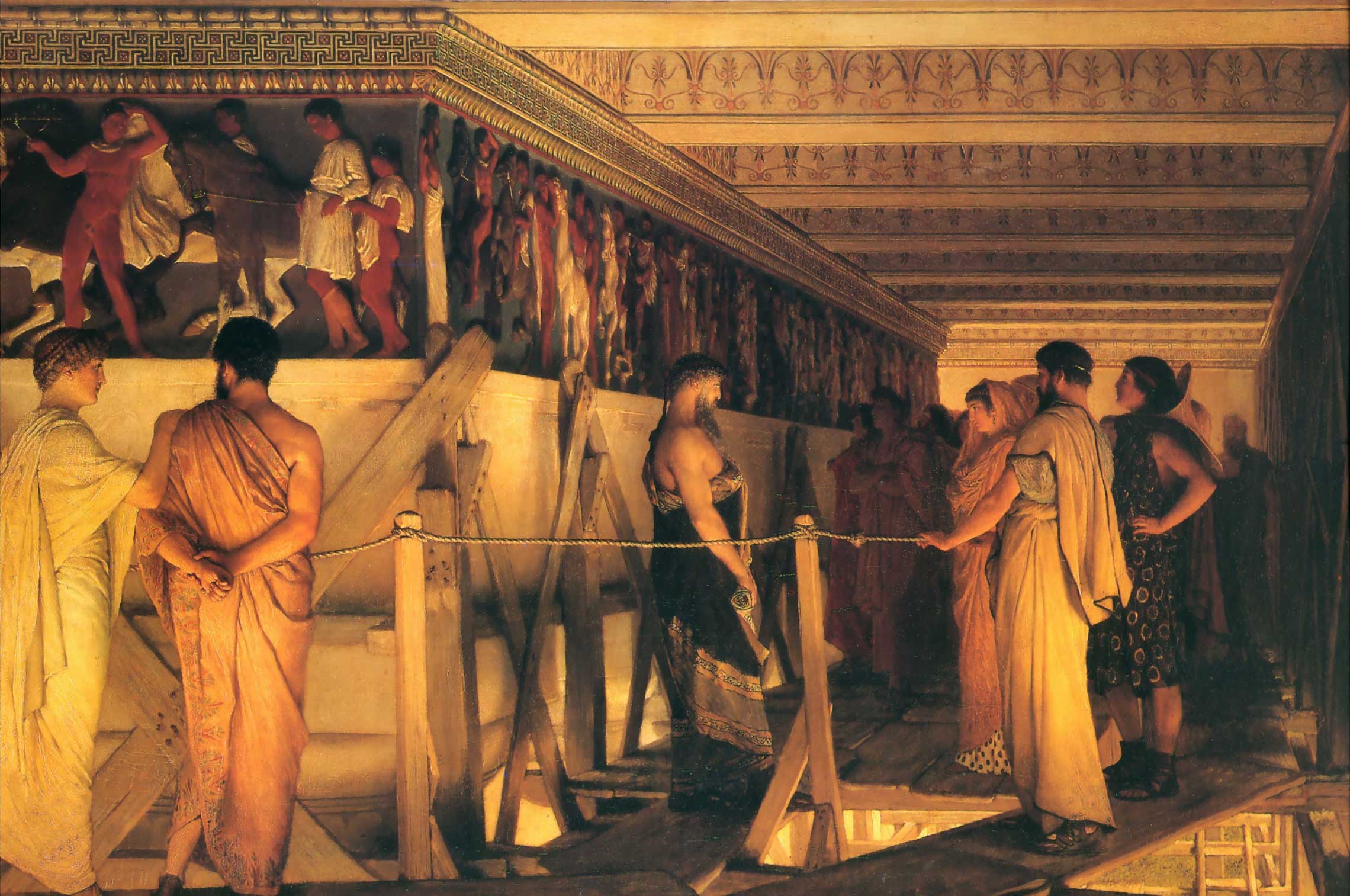
Phidias showing the freize of the Parthenon to his friends - by Lawrence Alma-Tadema (1868)
Birmingham (England) Museun and Art Gallery
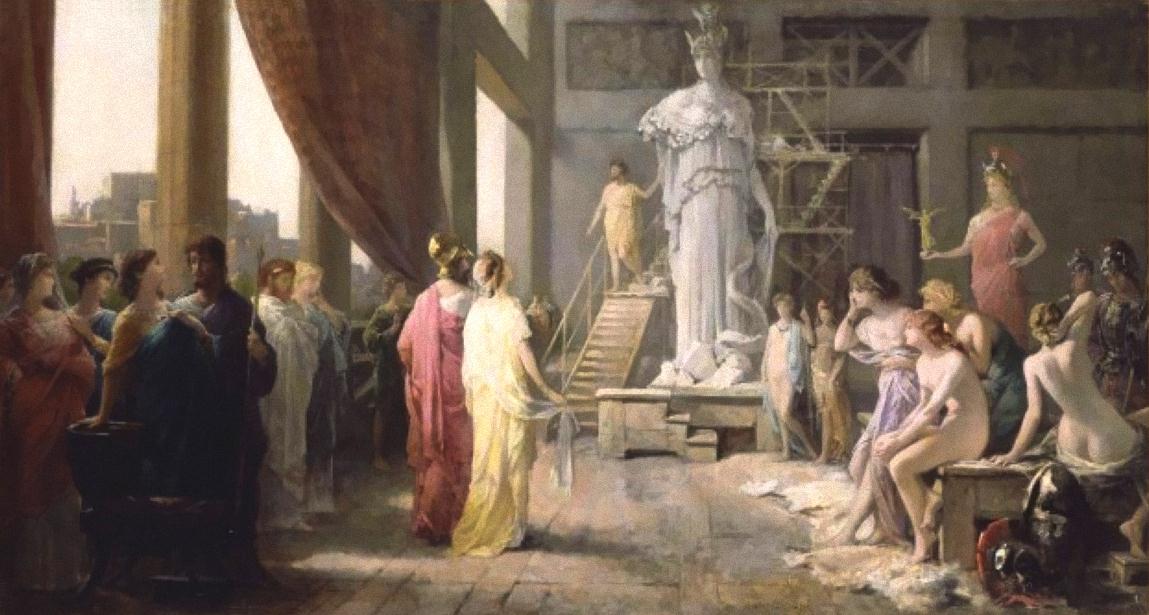
Pericles and Aspasia in Phidias' studio admiring his statue of Athena - by Hector Leroux 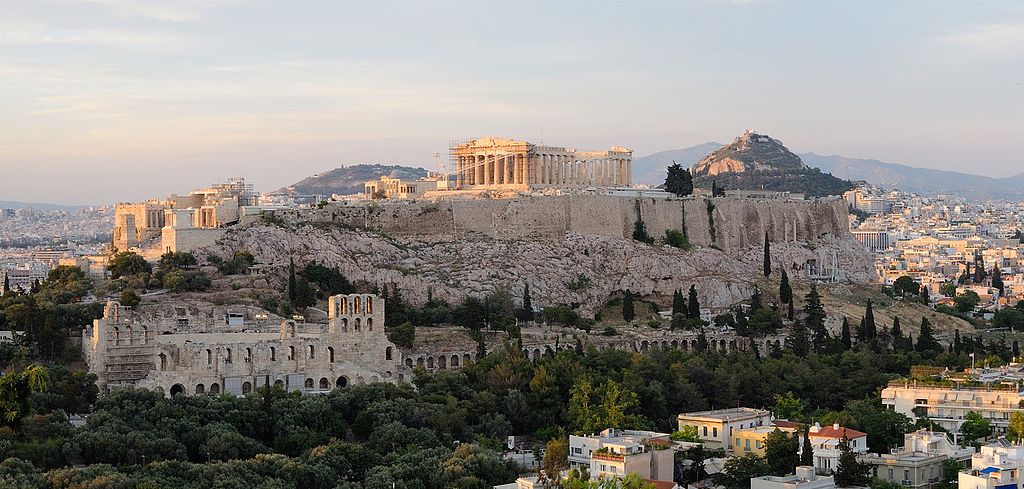
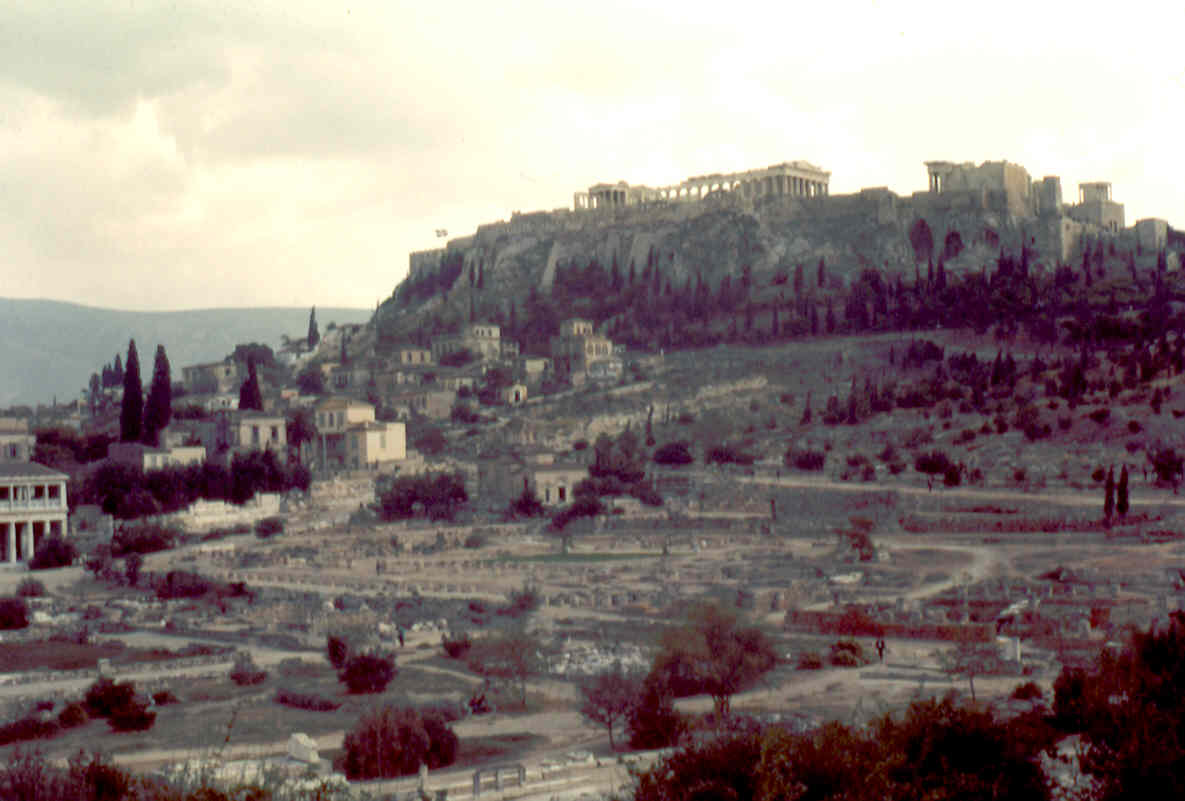
Athens - with the Acropolis
in the distance
Miles Hodges
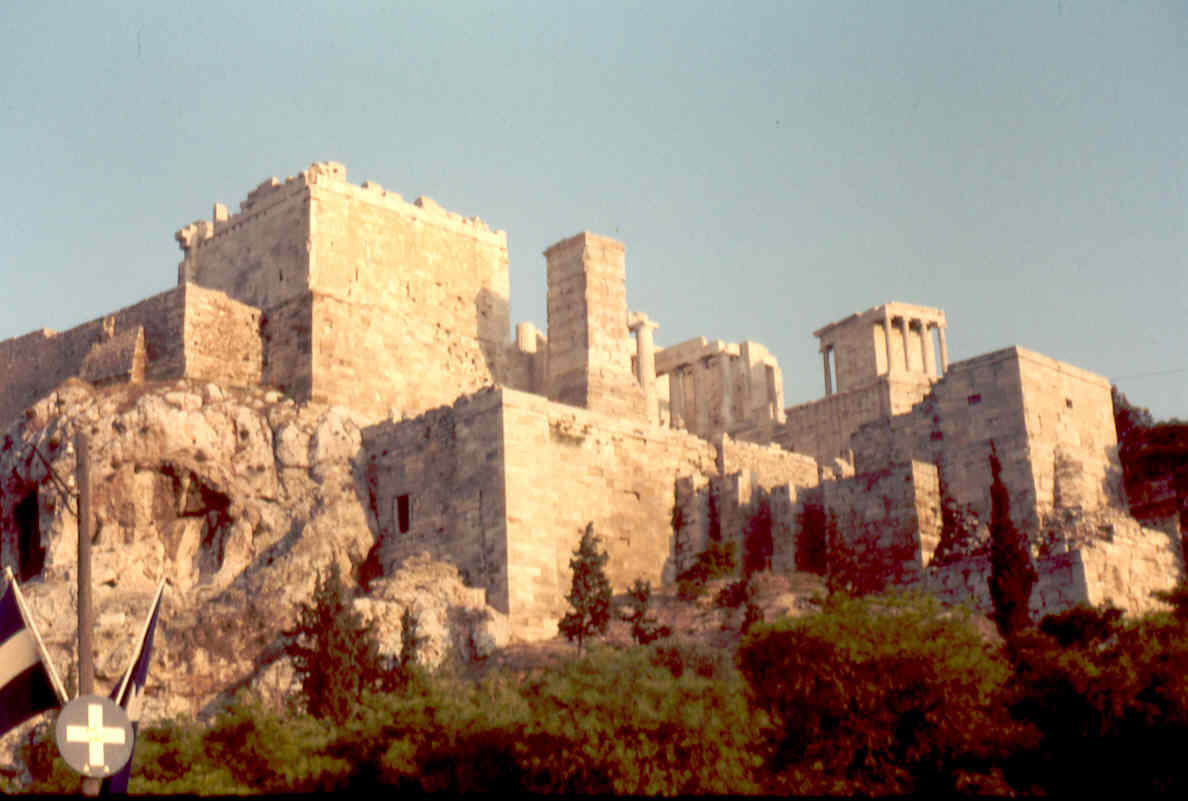
The front of the
Acropolis
Miles Hodges
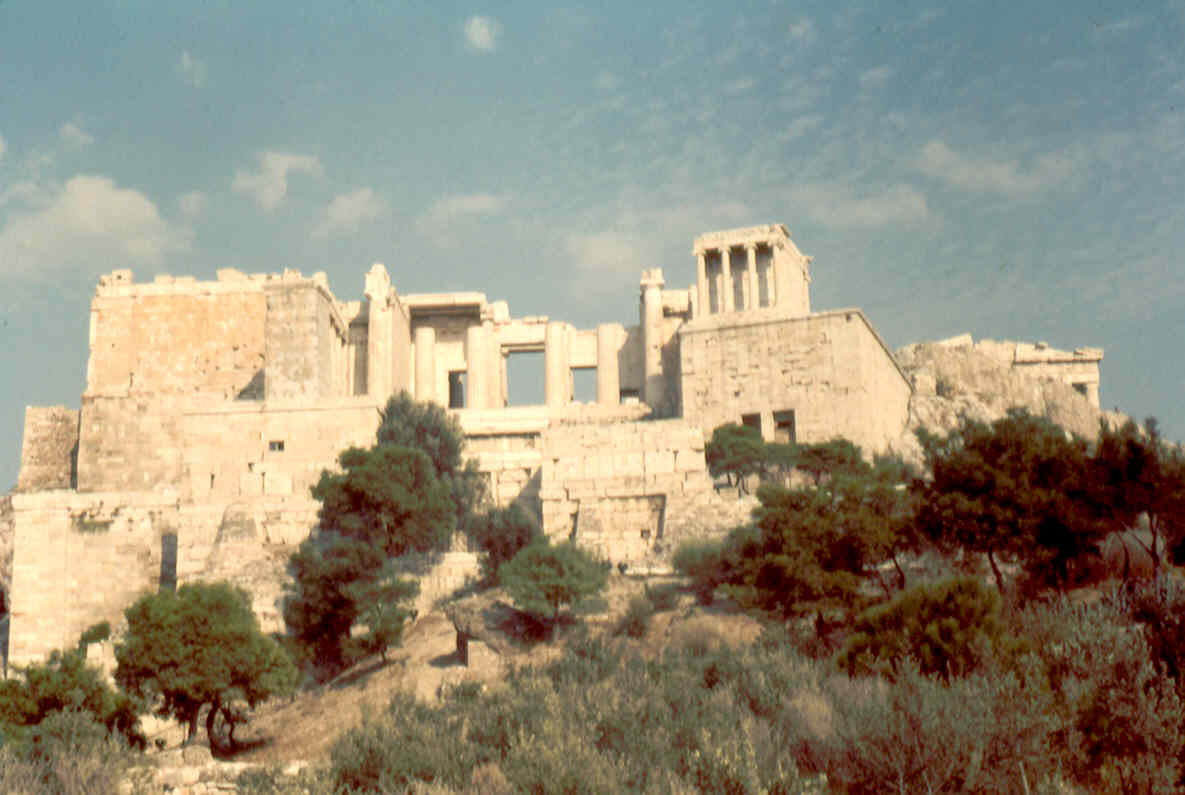
The front of the
Acropolis
Miles Hodges
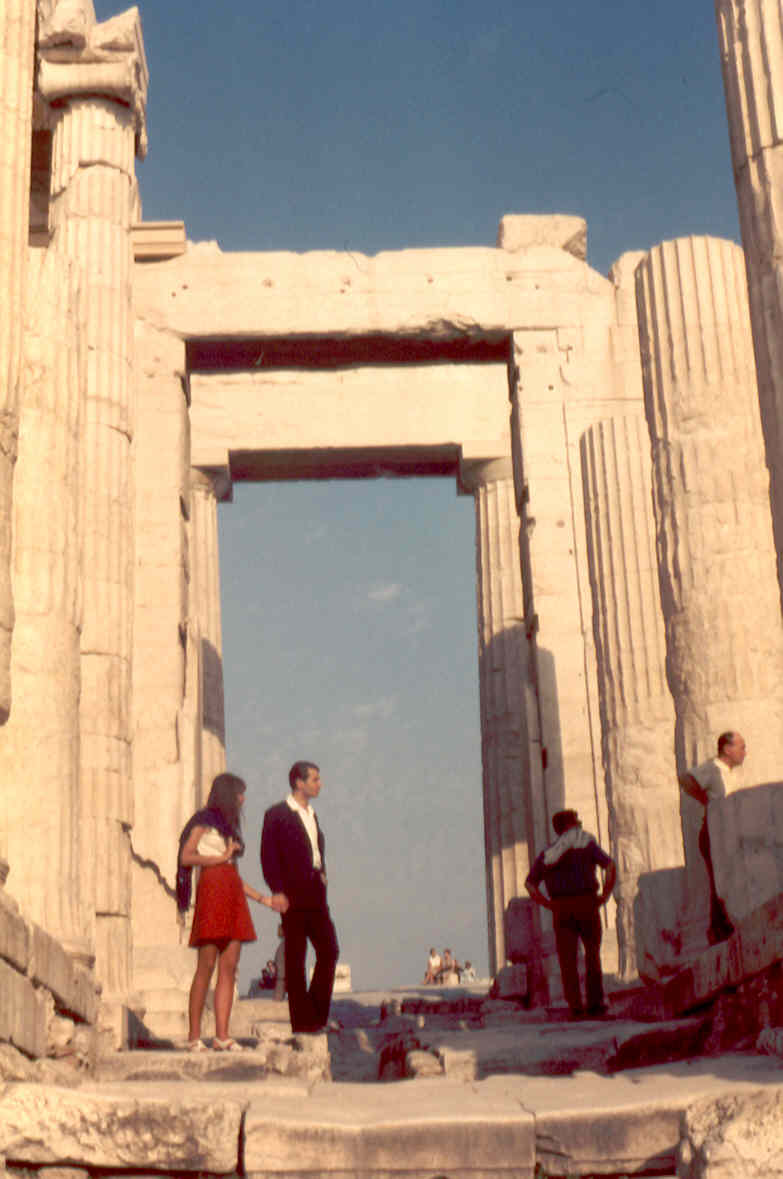
The entrance to the
Acropolis
Miles Hodges
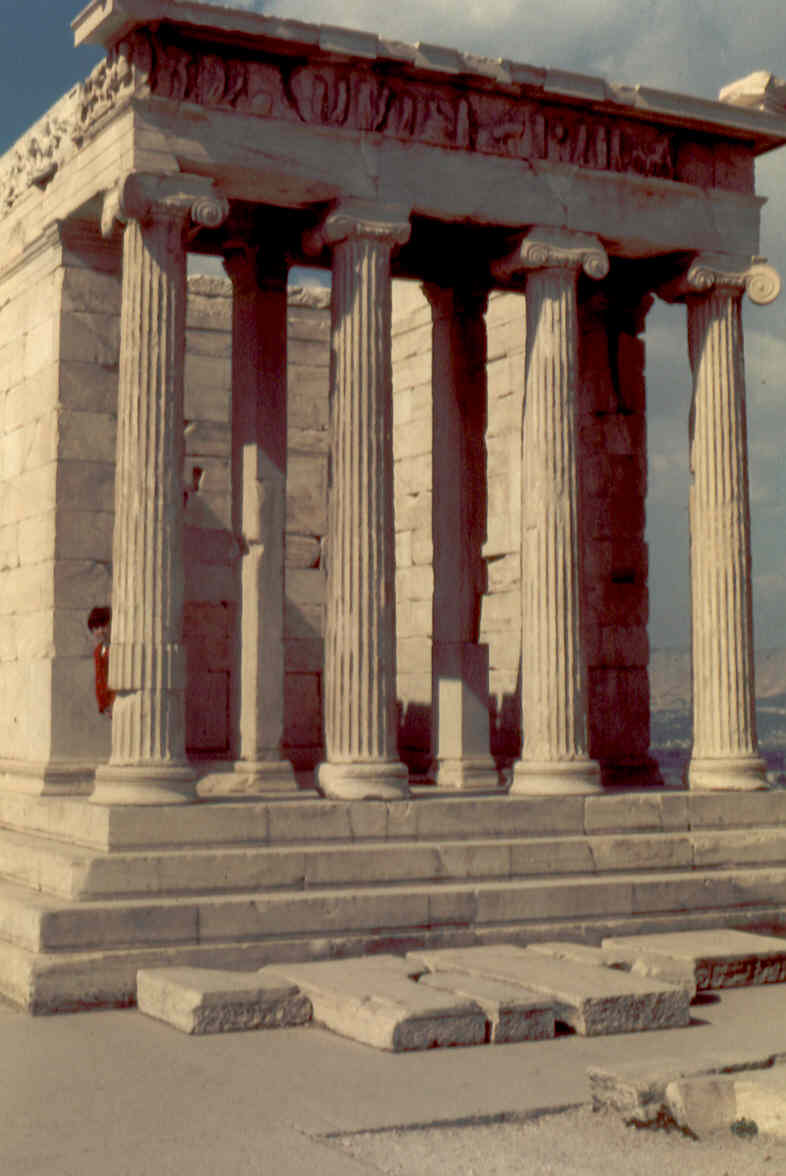
The Athena-Nike Temple on
the Acropolis
Miles Hodges
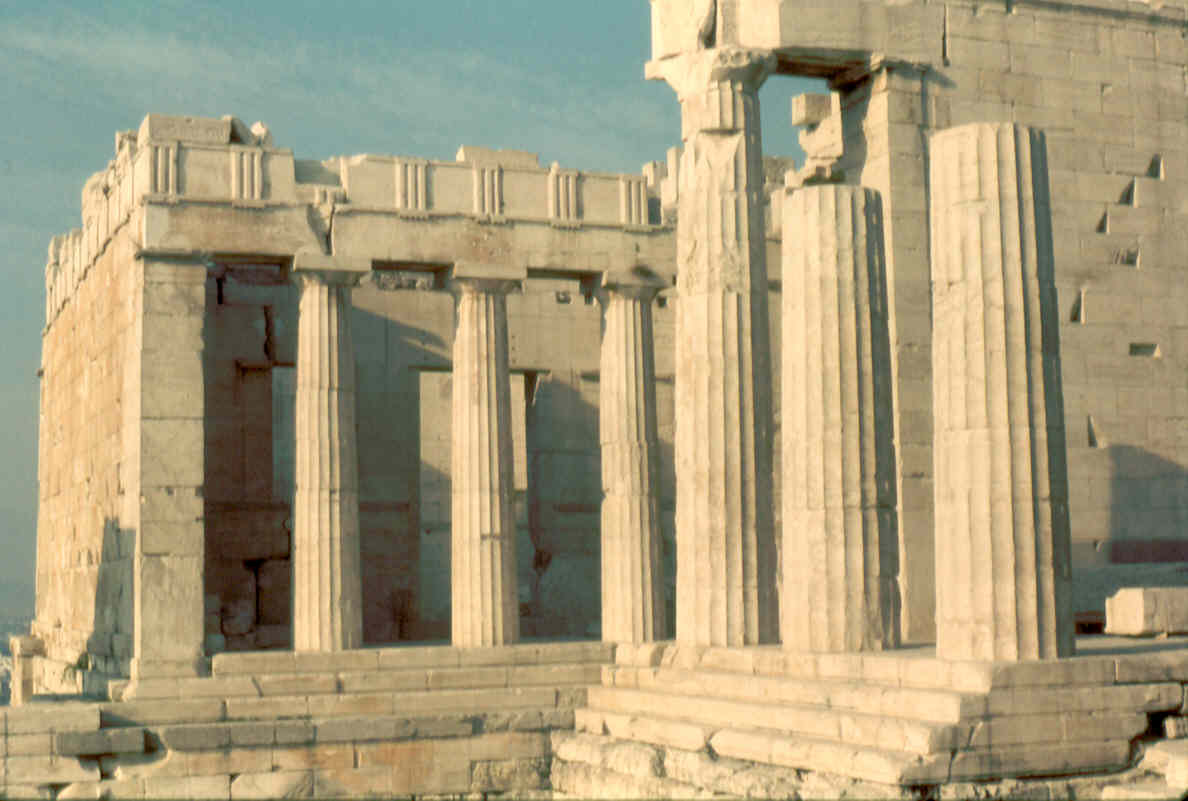
The Propylaea Temple on the
Acropolis
Miles Hodges
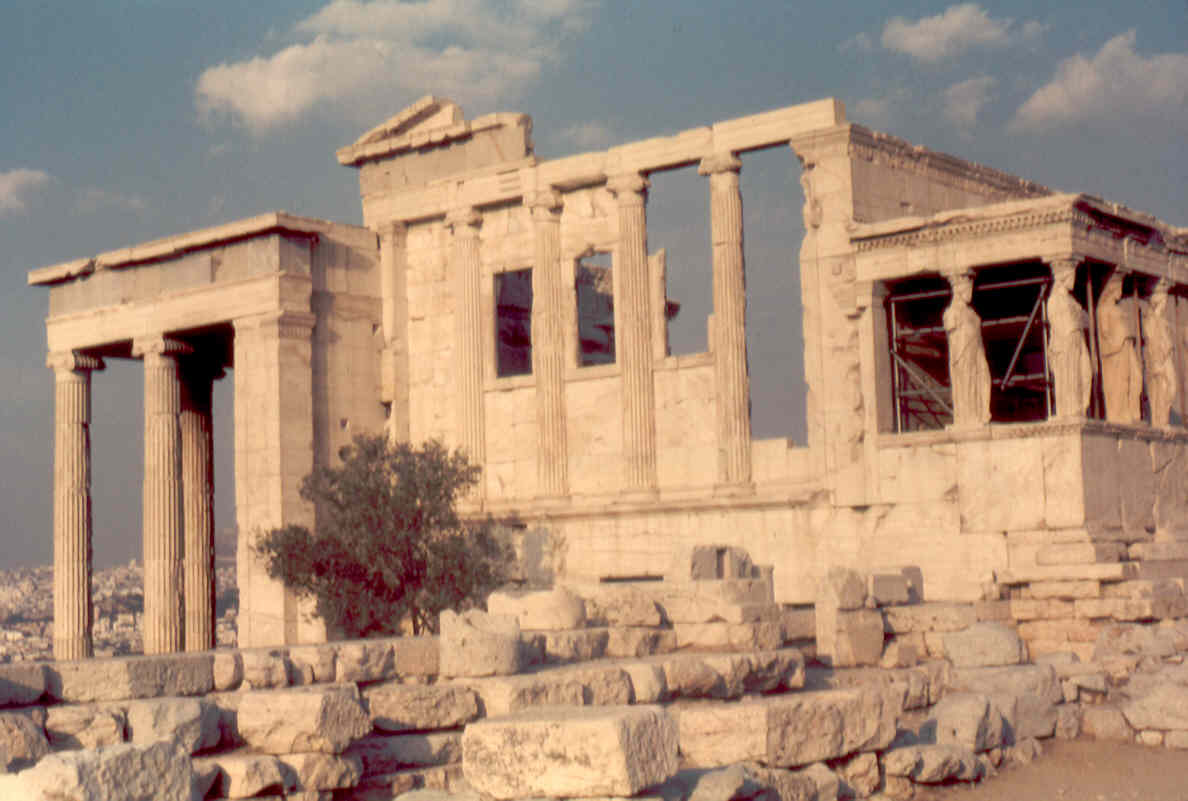
The Erectheum Temple on the
Acropolis
Miles Hodges
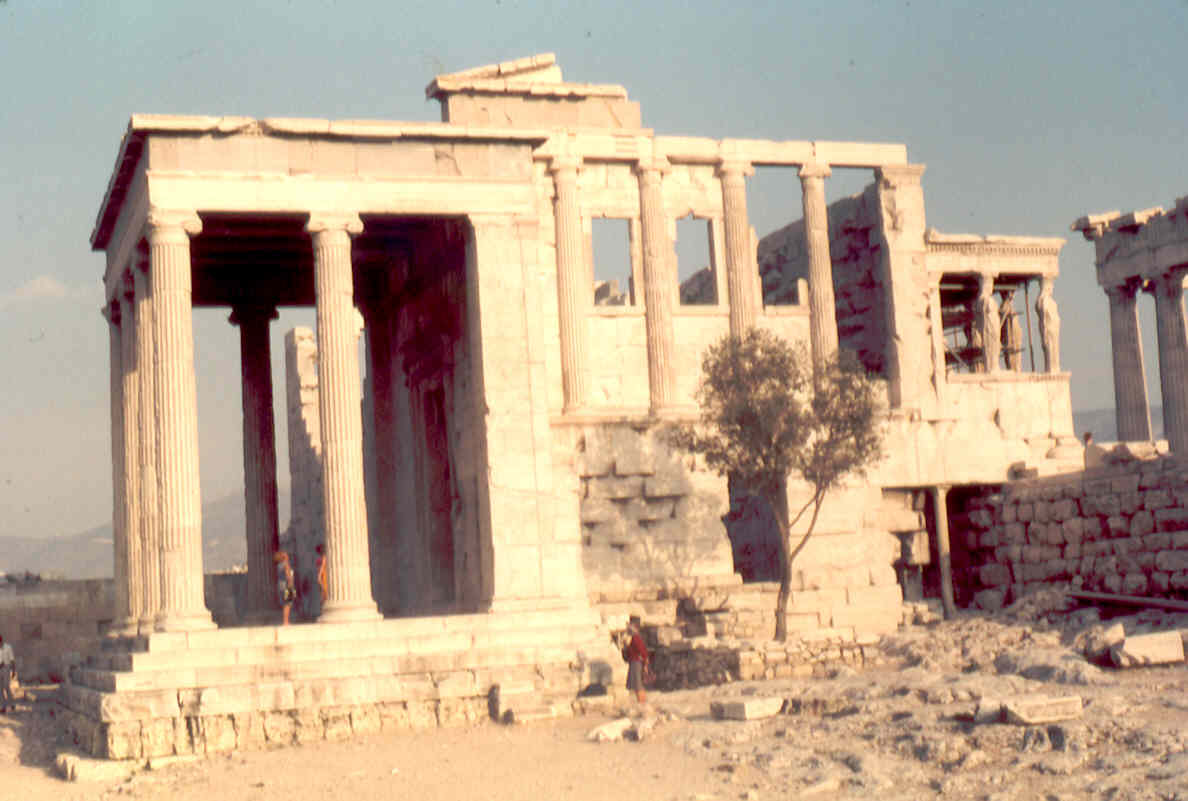
The Erectheum Temple on the
Acropolis
Miles Hodges
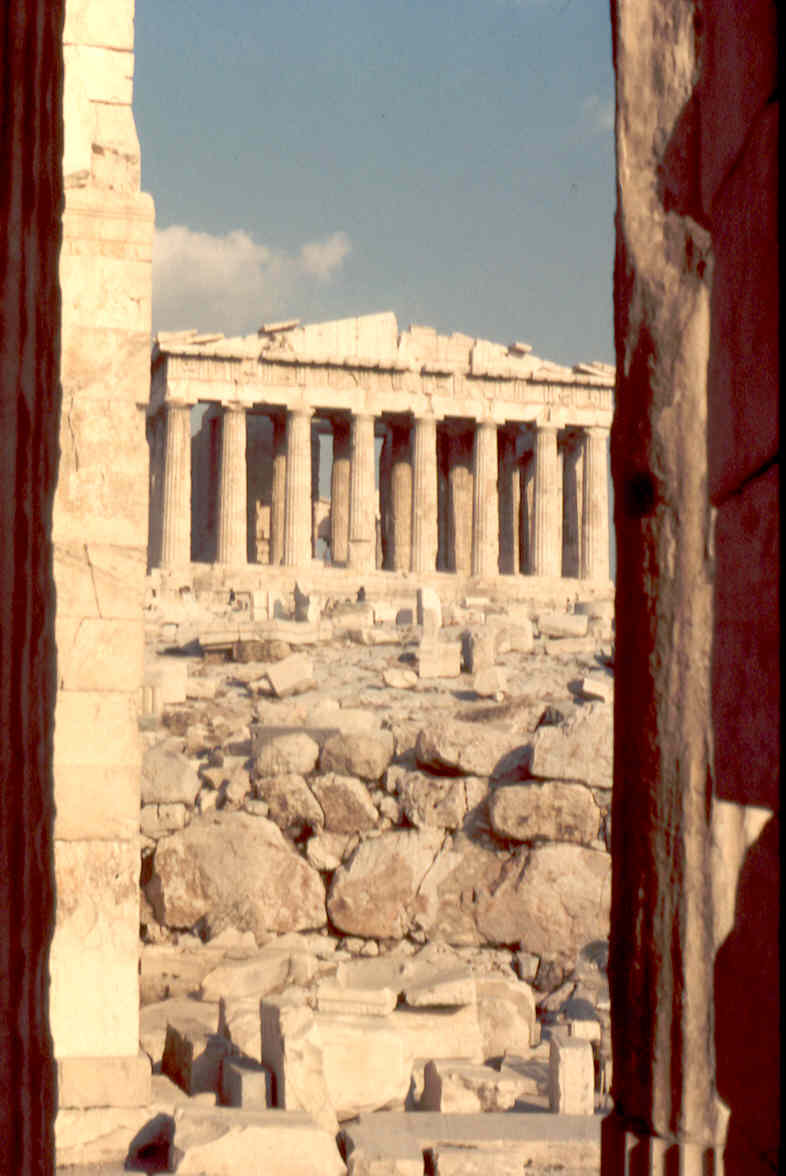
A view of the Parthenon on
the Acropolis
Miles Hodges
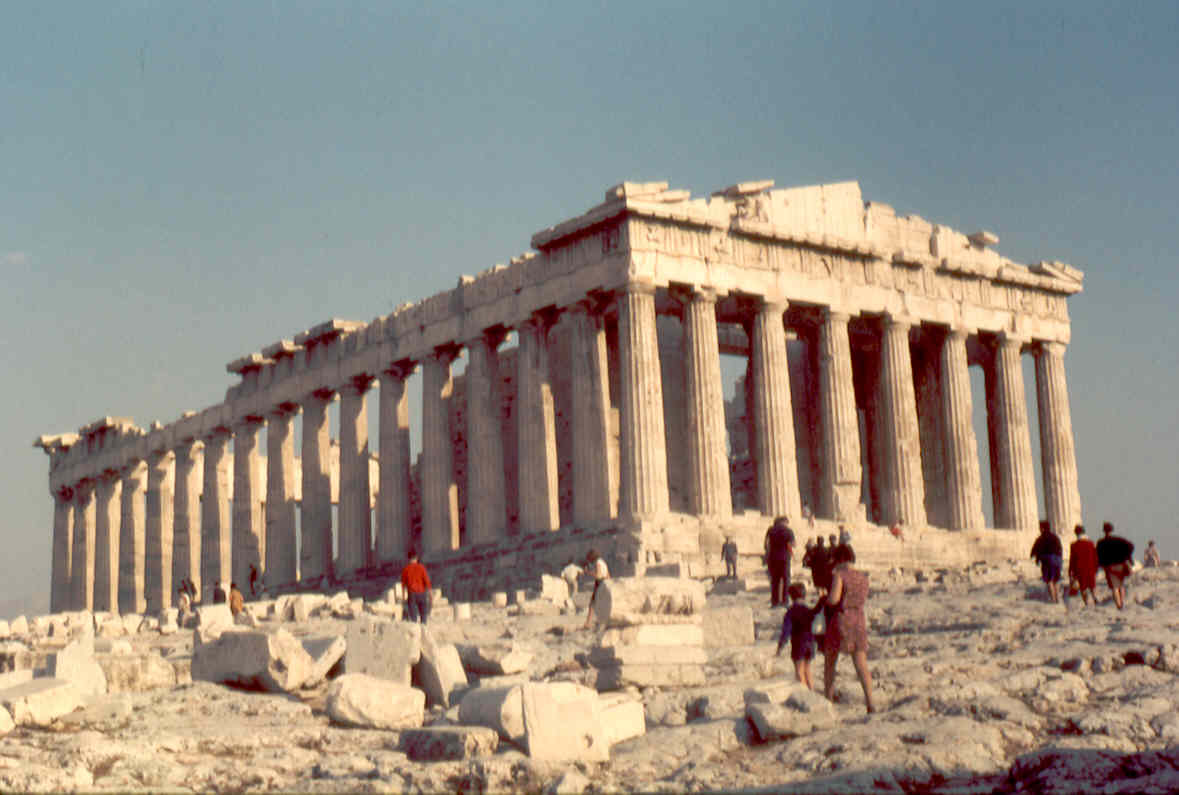
The Parthenon Temple atop
the Acropolis
Miles Hodges
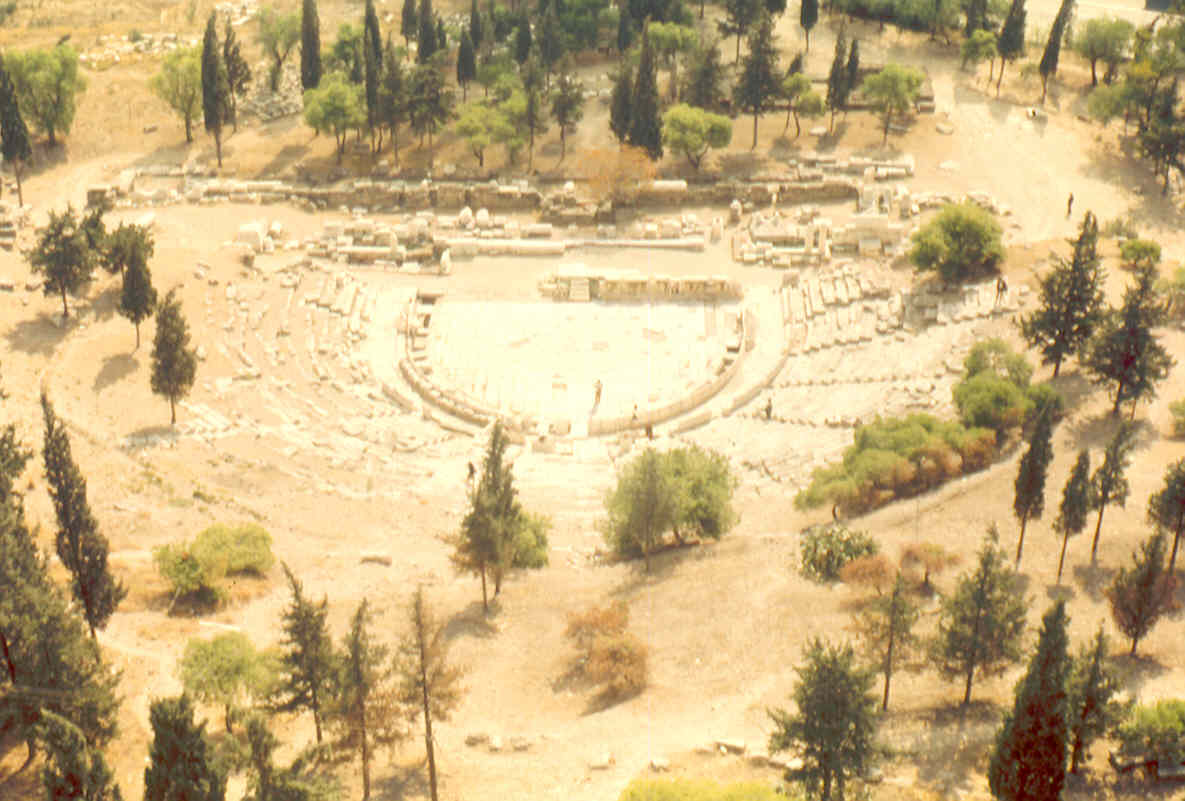
The Dionysian Theater – viewed
from the Acropolis
Miles Hodges
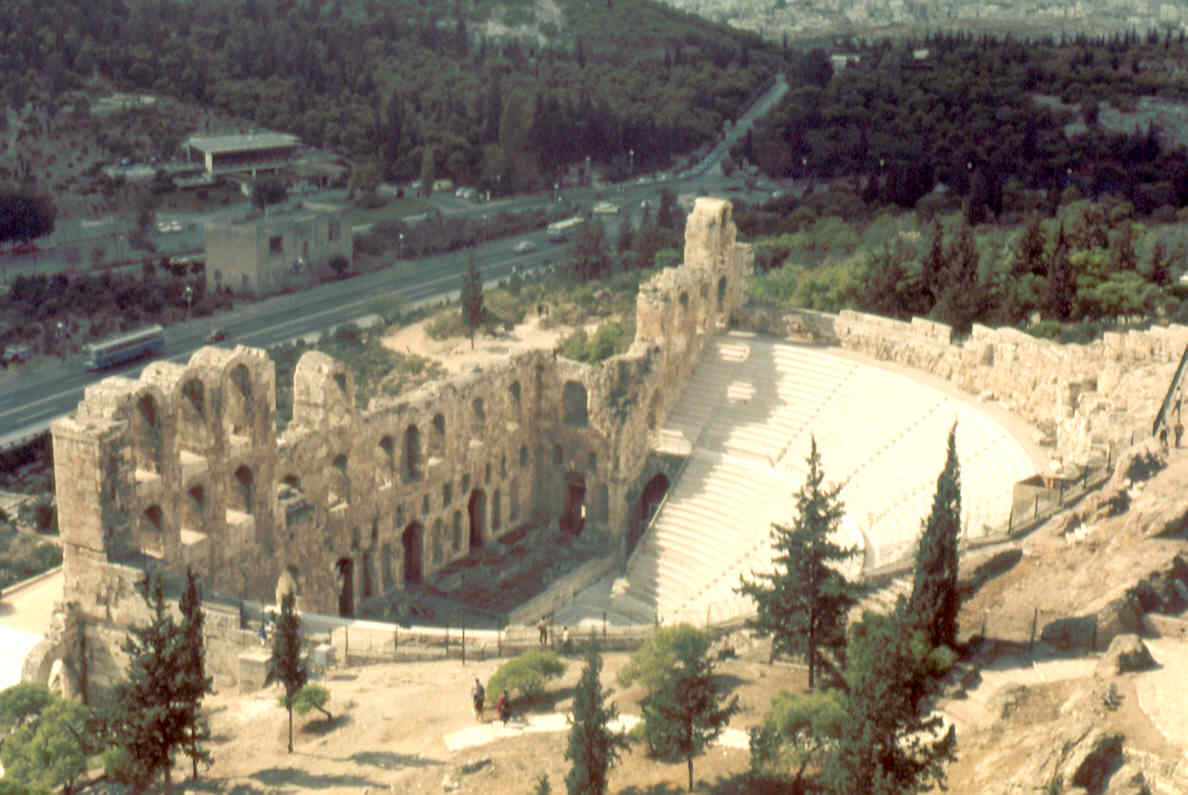
The Theater of Herod Atticus – viewed from the Acropolis
Miles
Hodges
Other Greek communities Sparta
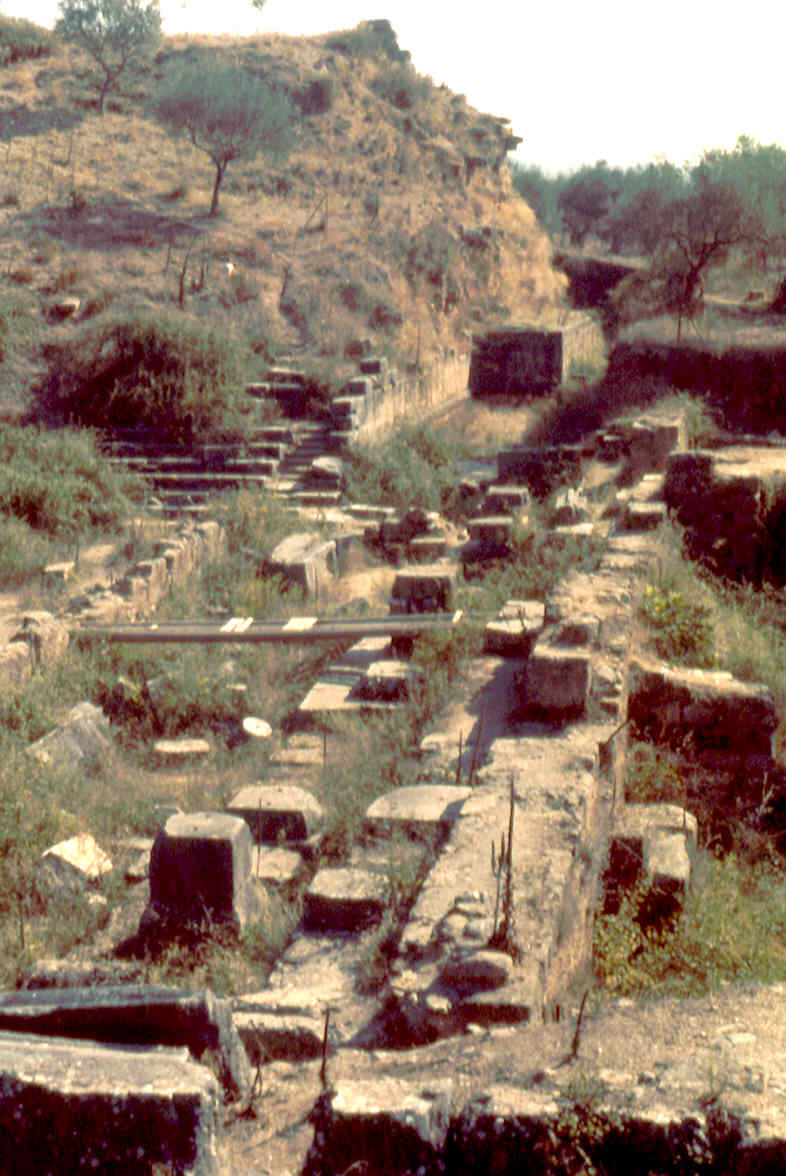
Foundation walls of
Sparta
Miles Hodges

Foundation walls of
Sparta
Miles
Hodges
Olympia
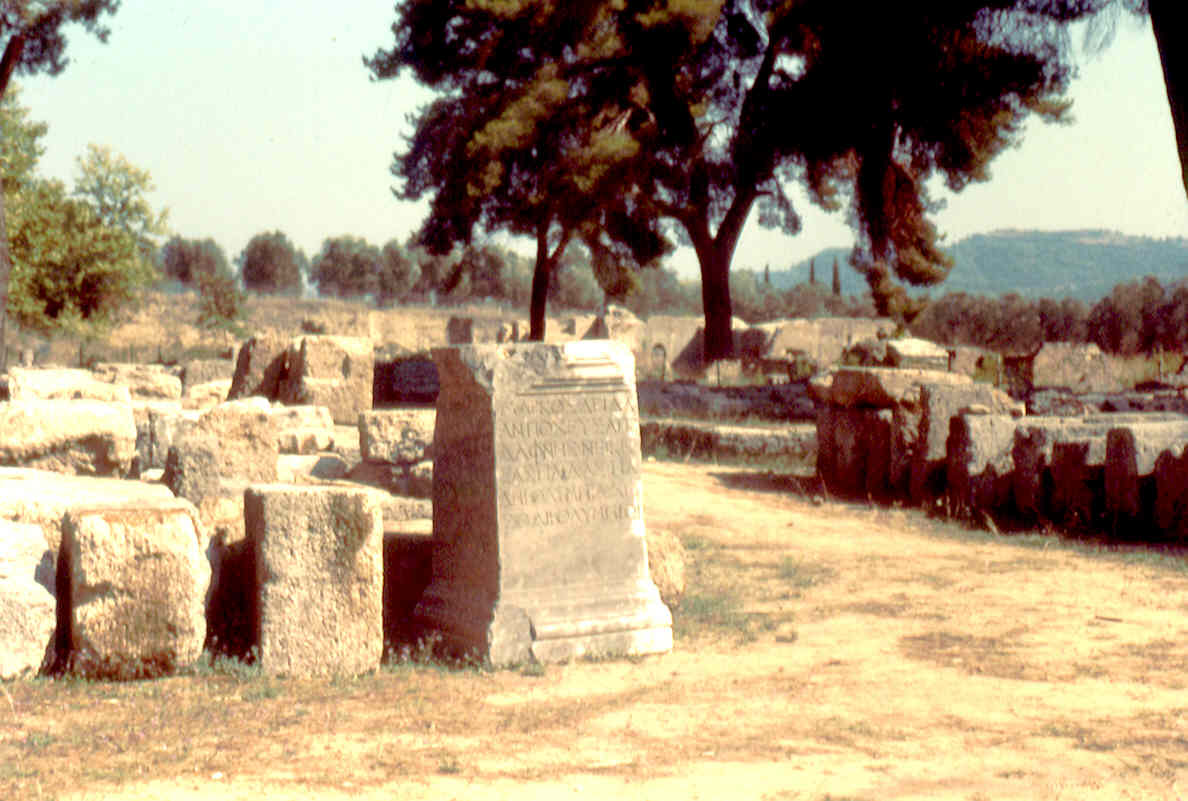
Ruins of ancient
Olympia
Miles Hodges
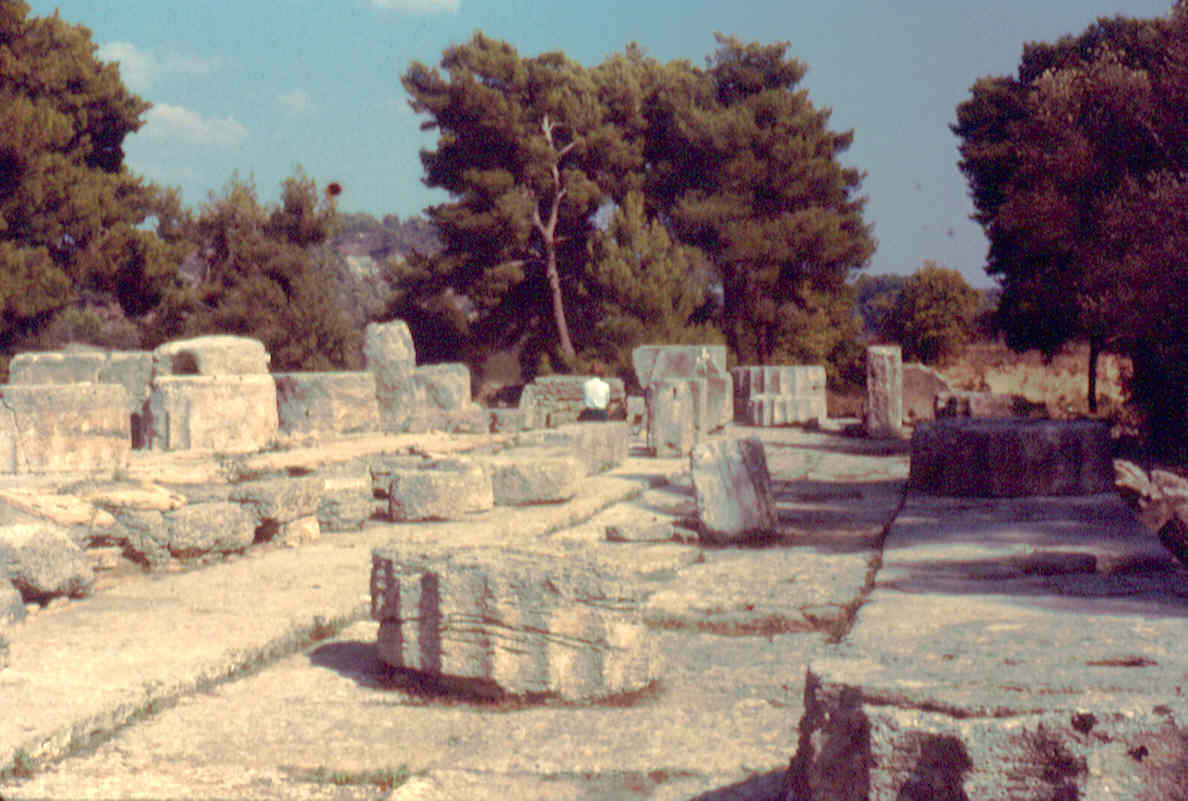
Ruins of ancient
Olympia
Miles Hodges
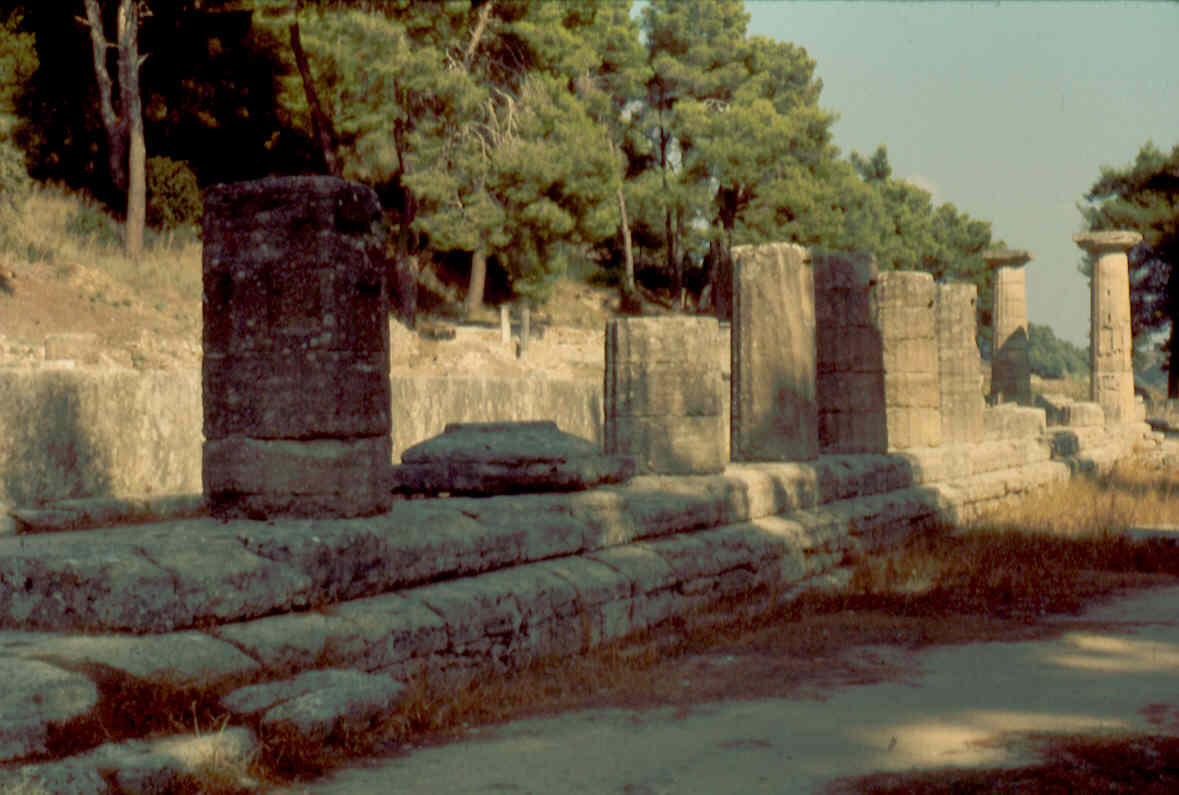
Ruins of ancient
Olympia
Miles Hodges
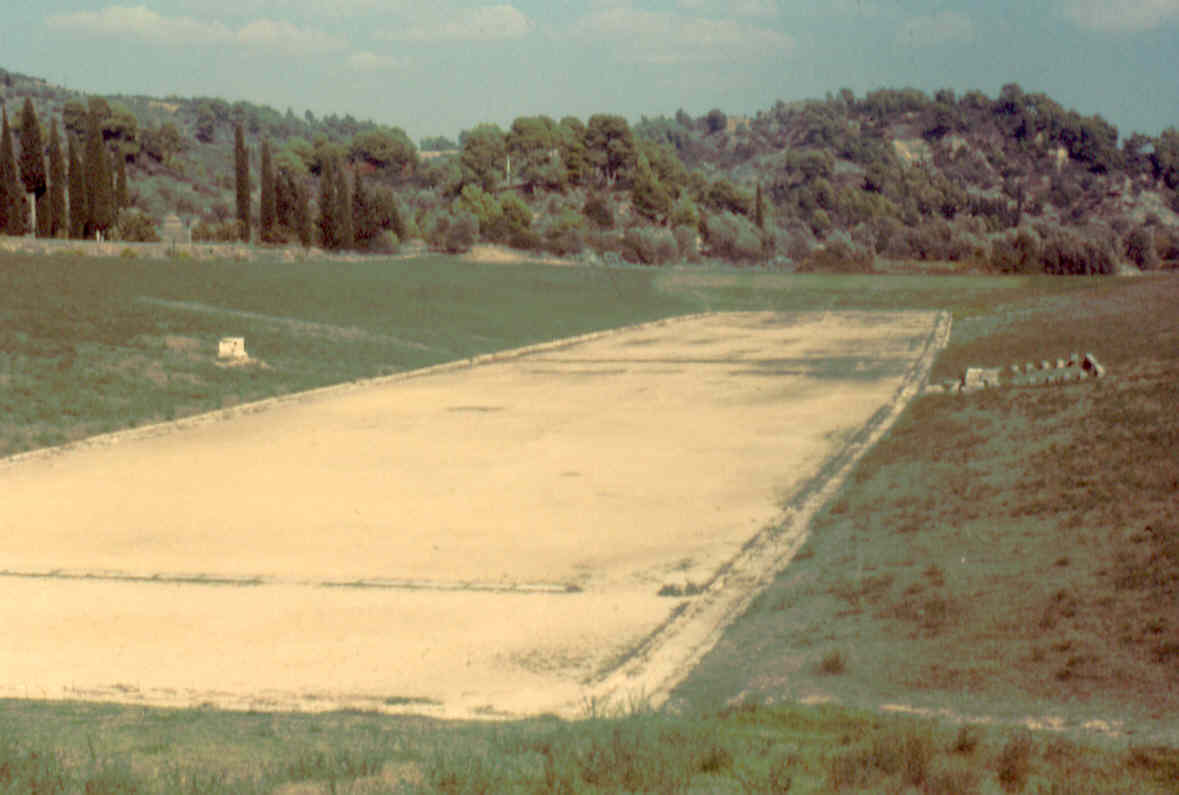
Reconstructed stadium at
Olympia
Miles
Hodges
ATHENS' POLITICAL-SOCIAL-MORAL DECLINE |
|
Athenian democracy under challenge
Actually,
Athenian democracy was more an attitude than a political institution or
policy. The commoners were jealous of their political rights and
quick to defend them against any appearance of usurpation from any
source. Tragically, this "democratic" attitude was easily molded
by the shapers of "popular opinion" – by the political satire of the
popular theaters of Athens ... and by the political maneuvering of
clever speakers in the Athenian Assembly, in particular by the Sophists
and their wealthy disciples – sort of the ancient version of modern day
trial lawyers, who specialized in playing on the prejudices and fears
of the people in order to whip up this or that popular mood ... which
they skillfully directed according to their own personal ambitions.
The Sophists.
As
the Athenians' public life in the middle and second half of the 400s BC
developed in its richness and importance, wealthy families hired tutors
for their sons in order to prepare them for leadership roles in the
public assemblies. This was where the laws guiding Athens would
be shaped. This was where economic, diplomatic and military
decisions that were key to the well-being of the community would be
made. They wanted their sons to become persuasive in their
rhetoric, quick in public debate and noble in their public bearing – so
that they would find themselves at the heart of the doings of these
public assemblies.
A particular class of wise ones or "Sophists" (Greek sophia
= "wisdom") gladly offered their teaching services for a fee to these
families. They built their learning or wisdom around the need to
produce practical results in the form of skilled or adept students. These
Sophists were sort of the ancient version of modern-day trial lawyers, who
specialized in using very clever and highly persuasive "rational"
arguments in order to win their cases. As demagogues, they proved highly skillful in cultivating the prejudices and fears of the people … to whip up this or that
popular mood.
As for the higher issues of life such as truth, goodness, justice,
etc., in general the Sophists tended to be agnostic – that is, they
professed to have no knowledge about (or even concern for) such
ultimate or transcendent things. Indeed, they functioned as if
such things did not really matter in the course of actual
existence. Success was measured not in possessing the knowledge
of ultimate truth, but in knowing how to use truths (or "truthiness" as
it is sometimes termed today) for personal political and economic gain.
Democratic cruelty
Ostracism. At the same time that wealthy Athenian
families were very busy in creating something of a newly-rising ruling
class of "more enlightened" individuals, at the level of the lower
social orders tendencies were also developing that would serve to
weaken further the moral foundations of Greek democracy.
One of these tendencies was the long-standing practice of "ostracism"
or the exiling of Athenians by their fellow citizens, because for one
reason or another they had fallen out of popular favor. At a
special general assembly, citizens were invited (usually by these
Sophist-trained demagogues) to record the name of a person they might
want exiled on a broken piece of pottery and deposit it in urns.
These pottery shards or ostraka were then tallied by a public
official. The person receiving the most votes (although at least
a minimum of 6,000 votes) was "ostracized" and thus automatically
exiled for ten years.
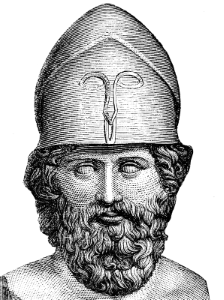 Themistocles is ostracized. In 472 or 471 BC the Athenian general Themistocles … who had been one
of the Athenian commanders at the Battle of Marathon, who then led the
Athenians to develop massive sea power and subsequently devised the
scheme to trap and destroy the Persian navy at Salamis, and who was the
leading political figure over the next ten years … was brought before
the ever-suspicious Athenian Assembly – fed by rumors coming from the
Spartans of a role in a political conspiracy (entirely false in fact,
designed cleverly by the Spartans to destroy their rival Themistocles)
– and adjudged by the Athenian commoners to be guilty of the crime of
arrogance. He was thus was ostracized. He fled to Macedonia
– then moved on to Ionia … where the Persian Emperor Artaxerxes offered
to bring him into Persian service as a regional governor! Themistocles is ostracized. In 472 or 471 BC the Athenian general Themistocles … who had been one
of the Athenian commanders at the Battle of Marathon, who then led the
Athenians to develop massive sea power and subsequently devised the
scheme to trap and destroy the Persian navy at Salamis, and who was the
leading political figure over the next ten years … was brought before
the ever-suspicious Athenian Assembly – fed by rumors coming from the
Spartans of a role in a political conspiracy (entirely false in fact,
designed cleverly by the Spartans to destroy their rival Themistocles)
– and adjudged by the Athenian commoners to be guilty of the crime of
arrogance. He was thus was ostracized. He fled to Macedonia
– then moved on to Ionia … where the Persian Emperor Artaxerxes offered
to bring him into Persian service as a regional governor!
Tragically for Athens itself, it would take some time and distance from
this sad episode before the Athenians would recognize the cruelty that
they had delivered to the one man … who not only saved Athens from
Persian destruction, but put the Greeks on the path to greatness.
Athenian arrogance / Athenian imperialism
Another (and similar) major problem facing the Athenian democracy would
be the arrogant attitude it came to assume with respect to its fellow
Greek city states – and the resentment this would breed among these
other Greeks. At this point Athens no longer was led by wise men
with a deep sense of high-minded virtue, but by cynical, manipulative,
self-serving politicians, setting a similar moral tone for the entire
Athenian community.
With the passing of time, as the Persian threat seemed to dwindle – but
Athenian collection of dues from its allies for "defense" purposes
continued nonetheless – resentment by members of the Delian League
against Athens grew, especially when it became obvious that this money
the other cities were sending to Athens had little to do with Greek
defenses and more to do with a lavish Athenian building program going
on during Athens' "glory days." Consequently, Athens' Greek
allies in the Delian League felt as if they had been seduced into
surrendering their independence to a growing Athenian Empire.
Certainly also, the money they were sending Athens could have been used
to improve their own cities. Anger against Athens began to grow
among the other Greek city-states.
Sparta, the major rival to Athenian power, with its well-disciplined
land army, was quick to take advantage of this discontent and organized
a rebellion against Athens in 431 BC. Also Thebes, seeing the
growing mood of Greek rebellion against Athens, decided to make a bid
for dominance in Greek affairs.
The Peloponnesian Wars, and the decline of Athens.
Thus wars (the "Peloponnesian Wars") broke out in Greece (431-421 BC;
421-404 BC; 395-378 BC), wars that tended to ravage Greece – yet seemed
to resolve nothing. The worst of these were the engagements
between 431 and 404 BC. Truces would be declared only to have one
party or another decide that it was advantageous to break those
treaties and start up a new round of wars. Also political leaders
played treacherous games of shifting their loyalties according to their
personal advantage.
Pericles' efforts to keep Athenian spirits high.
For a while the great general and Athenian political leader Pericles
was able to keep Athenian spirits high as it struggled with the
hostility of the surrounding Greek world. But Athens had taken on
a war that would drain it economically and spiritually … and offer no
gain whatsoever in return. Consequently, Athens found itself
bleeding to death economically and spiritually.
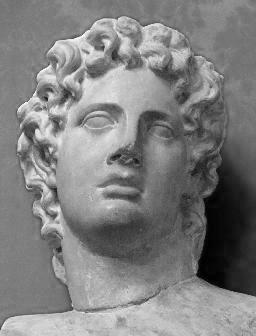 Decline.
Thus things went quickly downhill for Athens. A long-lasting
siege of Athens by Sparta created devastating conditions within Athens,
taking the lives of many Athenians, including Pericles (429 BC).
Athens' new leader Alcibiades
(Pericles' nephew) proved to be largely a disaster for Athens, as he
led Athens on ruinous expeditions and switched loyalties constantly ...
including even siding with Athens' enemies, first Sparta (415-412 BC)
and then Persia (412-411 BC) during his cynical political career! Decline.
Thus things went quickly downhill for Athens. A long-lasting
siege of Athens by Sparta created devastating conditions within Athens,
taking the lives of many Athenians, including Pericles (429 BC).
Athens' new leader Alcibiades
(Pericles' nephew) proved to be largely a disaster for Athens, as he
led Athens on ruinous expeditions and switched loyalties constantly ...
including even siding with Athens' enemies, first Sparta (415-412 BC)
and then Persia (412-411 BC) during his cynical political career!
Ruin. The war
gradually led not only Athens but also much of the rest of Greece to
ruin. Finally, in 405 BC, the Spartans (now allied with the
Persians) defeated Athens even at sea – and Athens was forced into a
humiliating surrender, forced to tear down her town walls, surrender
her fleet and give up all her overseas possessions. Only Sparta's
compassion prevented Corinth and Thebes from getting their wish to
level all of Athens and also enslave the entire Athenian population.
Socrates is condemned to death.
Even more tragically, the West's most famous philosopher, Socrates –
who was loudly critical of the amoral antics of the Sophists – would
eventually (late 400s BC) become the object of the satire of the
playwrights (notably Aristophanes) and the demagoguery of the Assembly
speakers. Both groups turned the public against him.
In 399 BC the Assembly voted for Socrates' death ... given somewhat
honorably in that he was to inflict this punishment on himself (poison,
usually). Actually, they expected Socrates to do what most
Athenians did when the Assembly turned against them: flee Athens.
This was certainly the counsel of Socrates's devoted disciples.
But Socrates reasoned that to flee would be to discredit the very
truths and moral principles to which he had dedicated his life in his
teachings. Thus he took the poisonous hemlock and died,
surrounded by his disciples.
Socrates's death by the decision of Athens' democratic Assembly
consequently caused democracy to be intensely distrusted by some
(Socrates' famous student Plato, for instance) or at least not highly
regarded (Plato's equally famous student Aristotle, for instance).
|
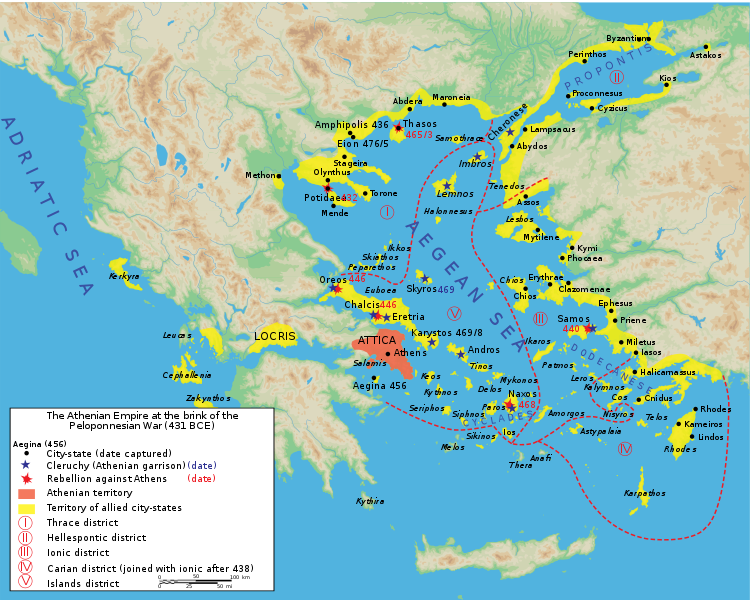
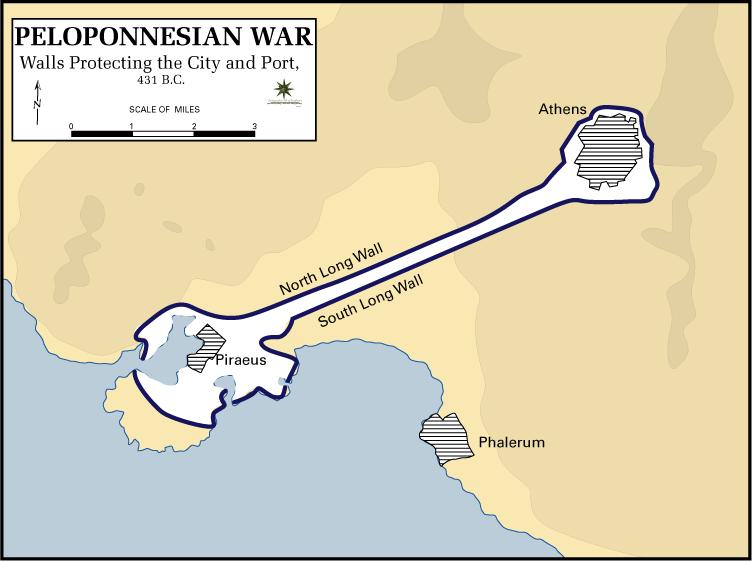
THE "BIG THREE": SOCRATES, PLATO, AND ARISTOTLE |
 Socrates
is known largely through Plato's heroized representation of him.
We know that subjects such as social ethics or public morality were of
great interest to him – though he was also interested in such subjects
as justice, beauty, goodness, and even physics and metaphysics.
Above all, he was interested in conveying to his students the
understanding of how to live a life of honor and truth … particularly
in service to the larger social order. Socrates
is known largely through Plato's heroized representation of him.
We know that subjects such as social ethics or public morality were of
great interest to him – though he was also interested in such subjects
as justice, beauty, goodness, and even physics and metaphysics.
Above all, he was interested in conveying to his students the
understanding of how to live a life of honor and truth … particularly
in service to the larger social order.
He was keenly aware that objective reality and what our minds
understand of reality are separated by a great mental divide (the
general consensus of Greek philosophy by that time). But to the
optimistic Socrates, rational inquiry, meticulously but humbly pursued
(his dialectical method), could close this divide. In using rational
methods of inquiry, human mind and soul could be brought to discover
transcendent (thus absolute) truth and goodness – and personal
happiness.
Socrates felt optimistically that knowing the truly good would
necessarily direct a person to act in line with this knowledge.
Also, the quest for such knowledge was the very heart of life itself –
its highest form (almost a divine enterprise).
Unfortunately, the Athenians proved not to be so enlightened by the
truth as he had hoped, and ordered him to poison himself … for
"teaching the youth not to reverence the gods" (something actually not
the case at all).
 For more on Socrates For more on Socrates
|
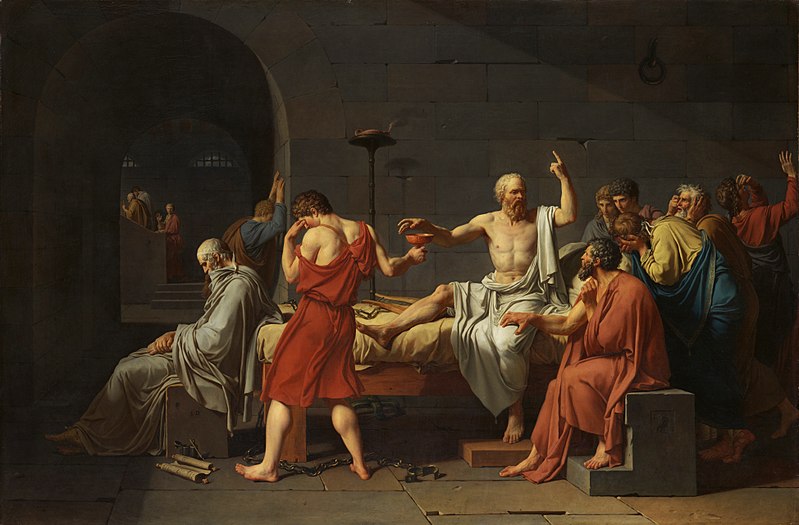
The death of Socrates - by Jacques-Louis David (1787)
Metropolitan Museum of Art, New York
|
Socrates's student Plato (427-347 BC)

The realm of the Ideon. These perfections were idealized Forms or Ideas (Ideon or Eidei
– terms he used interchangeably) like geometric forms that describe
life ideally. But though these Forms existed only as ideas, they
were more real than the visible world around us. But how could
Plato be so sure that these Forms we had never ever seen were so real?
His thinking went something like this. We know, for instance, that
there are no perfect circles to be found anywhere in nature. Some
things in nature only tend toward a perfect circular form and thus may
be called circular. But how is it that we know that they are not
perfectly circular? Only because for some strange reason our minds can
indeed hold clearly a distinct understanding of a perfect circle –
though we have never seen such anywhere in the world around us.
We can thus make such assertions about circularity – not because we
have seen perfect circles, but because we certainly hold the idea of a
circle clearly in our mind. If we could not conceive of such perfect
ideas in our minds, then we would not be able to think clearly or
rationally. The fact that we can think about circles, to Plato proved
their existence. This existence, of course, was not in the immediate
world around us, but in some mysterious realm of higher being or
thinking.
Plato was interested in uncovering this perfect world of the Ideon or
Forms – in bringing it to light to human understanding. Indeed,
this was to Plato (and by many "Platonists" who came after him) a
religious enterprise – not just a matter of detached scholarship.
Plato and the realm of politics.
With regard to the world of politics, most understandably, after what
the Athenian Assembly did to his teacher Socrates, Plato was no lover
of democracy. But Plato did believe that there existed part of
the realm of the Ideon ... able to guide our shaping of an ideal
state. In his Republic, Plato described that ideal state as one
that was divided by classes or castes into three levels of
society: workers, guardians (soldiers) and governors
("philosopher kings").
Tragically, when later in life Plato was called to Syracuse (Greek
Sicily) by Dion (a former student of Plato's) to help Dion's young but
dissolute nephew Dionysius II become just that "philosopher king" and
put such an Ideal State into effect, the whole thing ended up most
disastrously. Dionysius's older brother-in-law Dionysius the
Elder, who was actually ruling Syracuse at the time, was deeply
irritated by Plato's disdain of his attempts at being a popular tyrant
… and had Plato arrested. Plato was spared death only by being
sold into slavery … from which a friend of Plato's went on to purchase
his freedom. Oddly enough, when Dionysius the Elder died, Plato
was invited back by Dion to Syracuse to try again with the young
Dionysius. But Dionysius fought with his uncle Dion, and had him
expelled … but forced Plato to stay on. Plato was finally able to
get out of Syracuse. Ultimately the "philosopher king" Dionysius
found himself facing a popular uprising … in which he was ultimately
driven from power.
What Plato actually learned from all this very non-Idealist experience
in the realm of politics is not known to us today. Nothing in
Plato's writings points to any kind of development of his political
thinking because of this sad experience.
Apology
Republic
Laws
Statesman
Crito
Critias
Gorgias
Meno
Parmenides
Phaedo
Phaedrus
Sophist
Symposium
Theaetetus
Timaeus  For more on Plato For more on Plato
|
Raphael's School of Athens
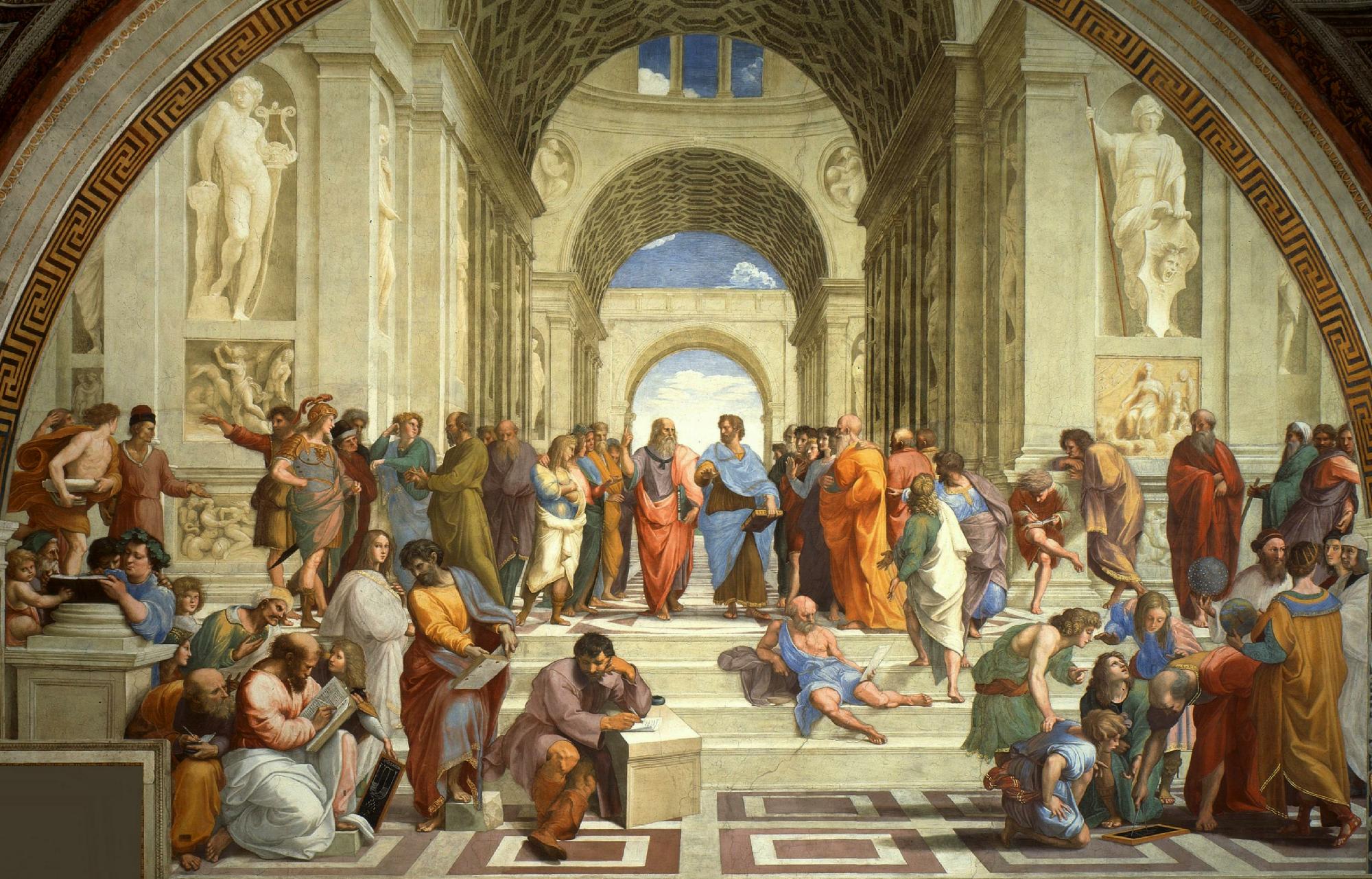
At the center, Plato pointing upward to the heavens; Aristotle pointing downwards to the earth ...
a keen depiction of the essential philosophical difference distinguishing the two!

Aristotle (384-322 BC)
Aristotle went in a direction opposite that of his teacher,
Plato. While Plato focused his attention on the mysterious world
of the perfect Forms, Aristotle focused his attention on the messier
visible world immediately around him. Aristotle was greatly fascinated
by this empirical or physical world. He was looking for Plato's
Forms actually contained within this visible world.
But Aristotle eventually surmised that these Forms were merely
abstractions in our mind which we use to categorize the immense
information that comes to us about the surrounding world. These Forms,
though useful to human logic, were themselves only mental constructs or
kategoriai (categories)
… useful to the human mind in developing an organized understanding of
how to understand and work with the surrounding world. "Dog," or
"barn", or "hot", or the color "red" were just such categories.
They had no separate existence like gods or defining spirits (as Plato
had asserted).
But Aristotle was deeply interested in exploring this world of
categories, trying to discover as many different categories as possible
… in all fields of life, from biology to geology, but also in the realm
of logic, ethics, and politics.
As already mentioned, in the field of politics, he was not particularly
interested in one or another particular category of social
organization, whether a society governed by a single person, or a few,
or even the many. What he understood as the "good society" was
one which – whatever the specific form – was carefully ordered by a set
of very strong moral foundations … ones that human cleverness would not
be able to manipulate – but which would offer clear guidance to that
society as it took on life's various challenges. He made this
very clear in his famous publication, Politics.
Most interestingly however, when it came to discussion of things beyond
this earthly realm – the heavenly realm of the sun, moon and stars –
Aristotle evidenced a religious awe. Though the earth might be marked
with physical imperfections, these heavenly bodies were the essence of
the divine, for they were perfect – perfect in their circular shape and
circular movement. Thus for Aristotle the perfect-imperfect
dualism in life occurred not between things seen and unseen (as it had
for Plato), but between the imperfect things seen on earth and the
perfect things seen in the heavens.
Thus even in his religion, Aristotle remained focused on the visible
universe around him. "Heaven" was not a place found beyond the
visible world … but instead was located quite visibly in the skies
above. Beyond that, Aristotle had no particular opinion about the
"heavenly realm" of the gods or whatever.
|

Go on to the next section: Alexander and Hellenism
 Miles
H. Hodges Miles
H. Hodges
| | | | |


 The ancient Greek political-intellectual
The ancient Greek political-intellectual Early philosophical development:
Early philosophical development: Athens' political-social-moral decline
Athens' political-social-moral decline
 The Big Three: Socrates, Plato and
The Big Three: Socrates, Plato and

































































